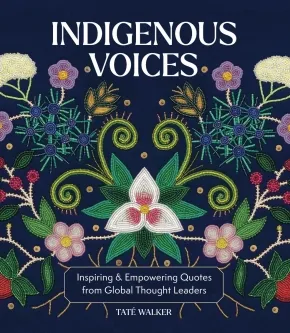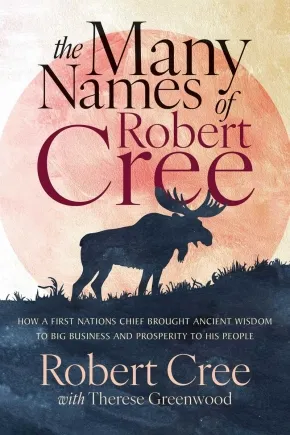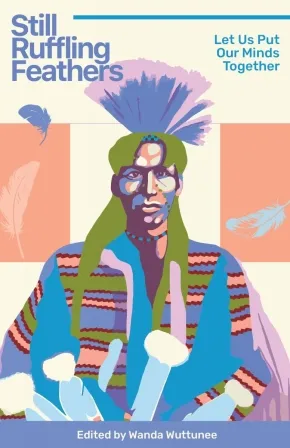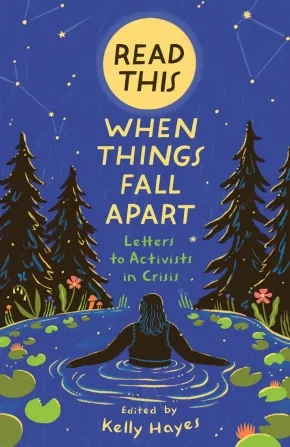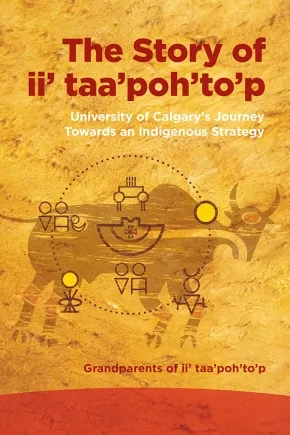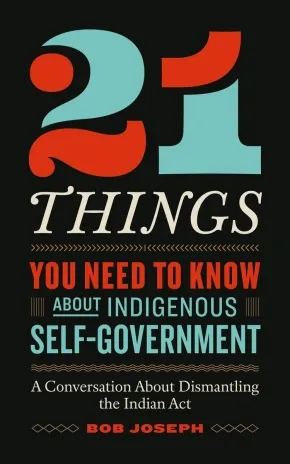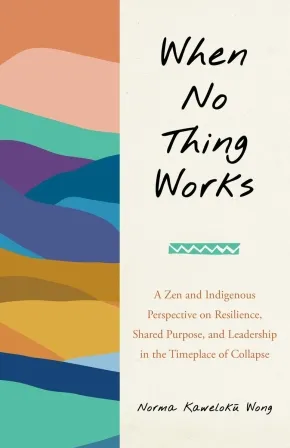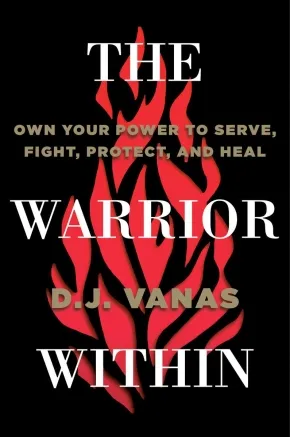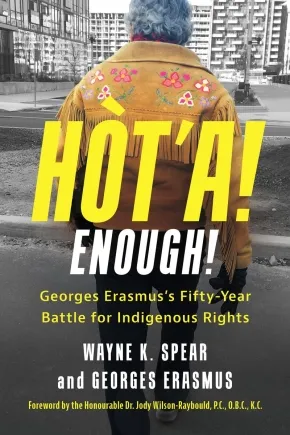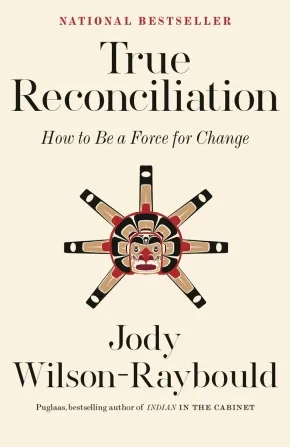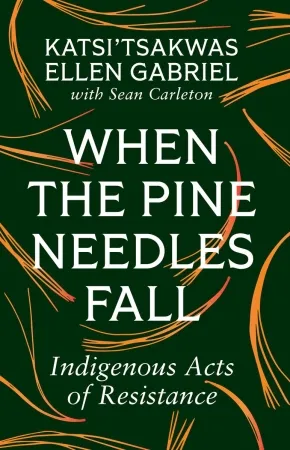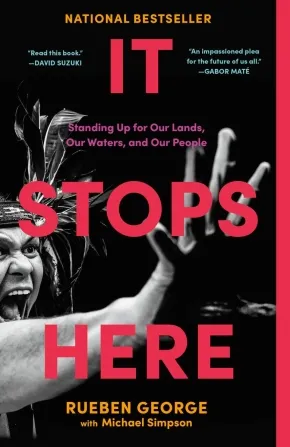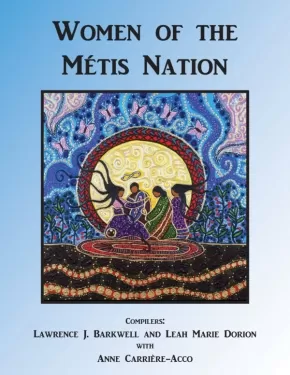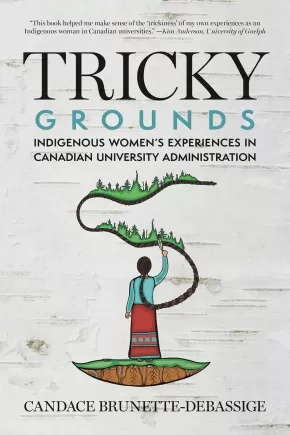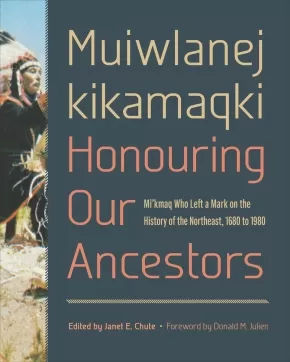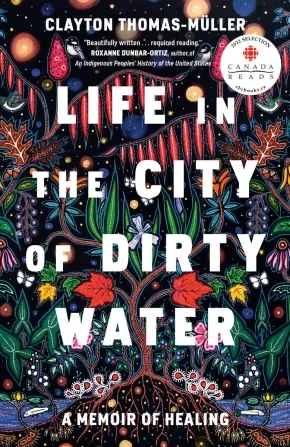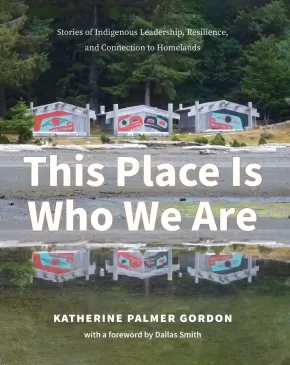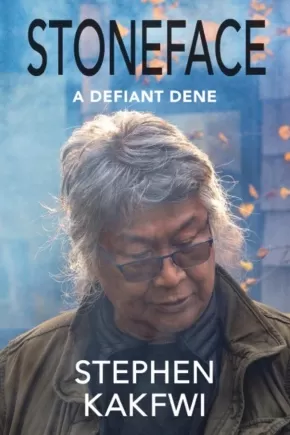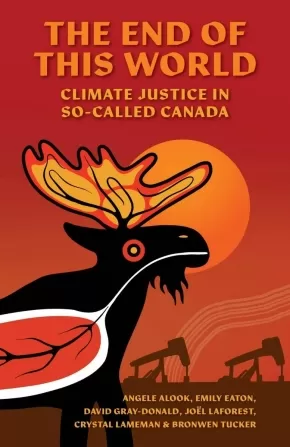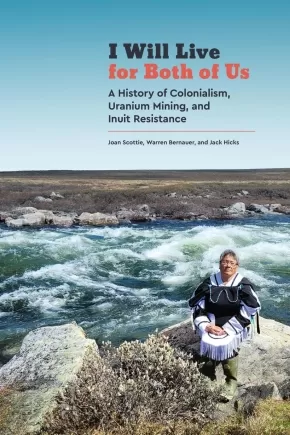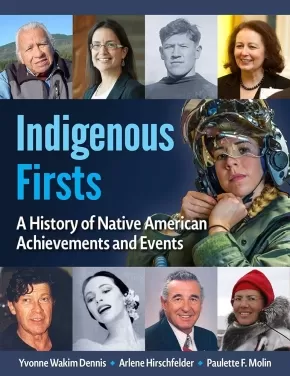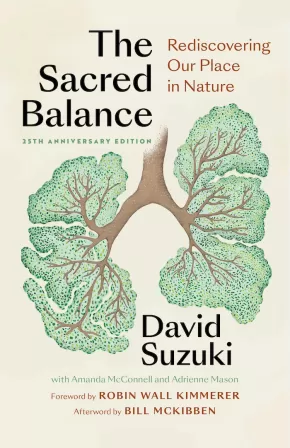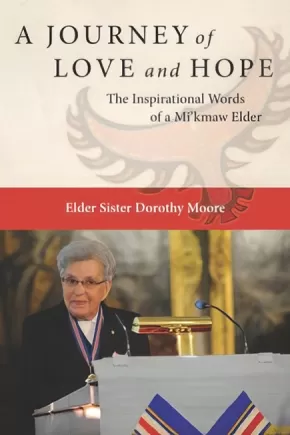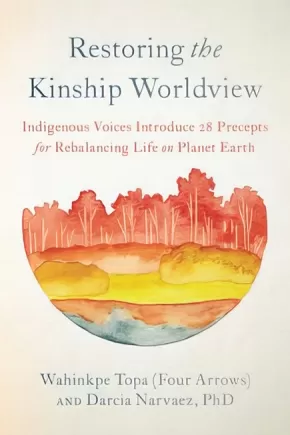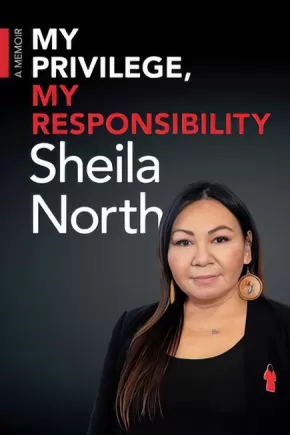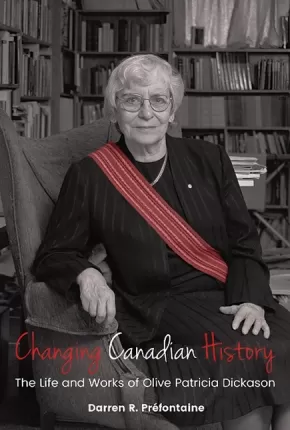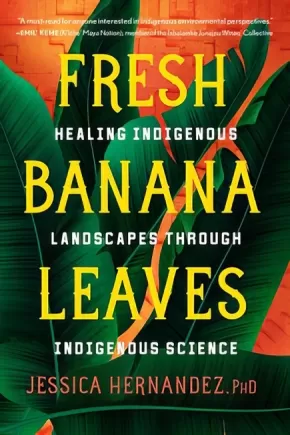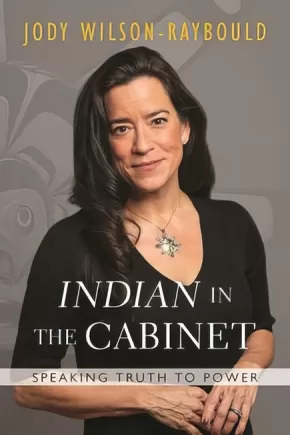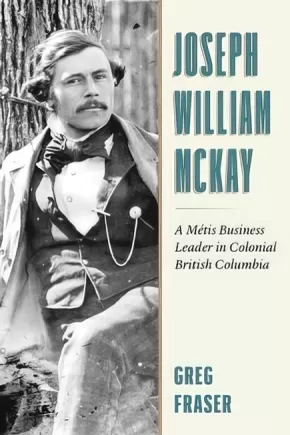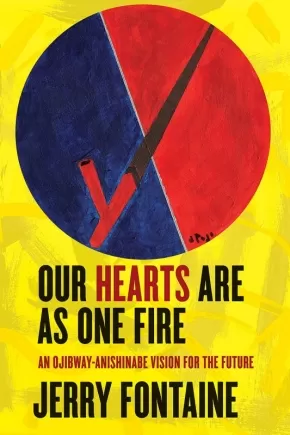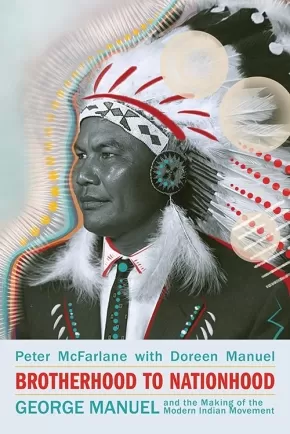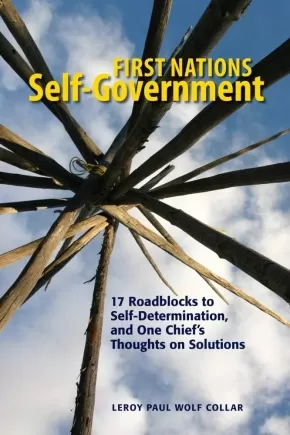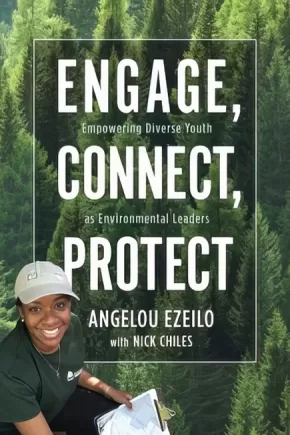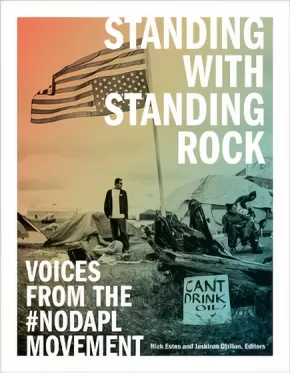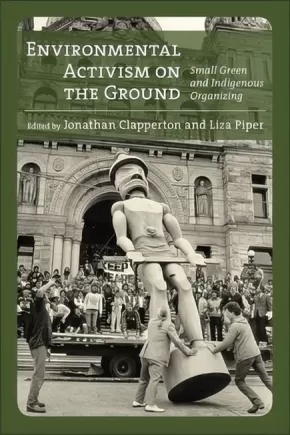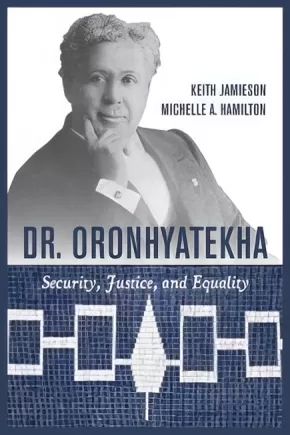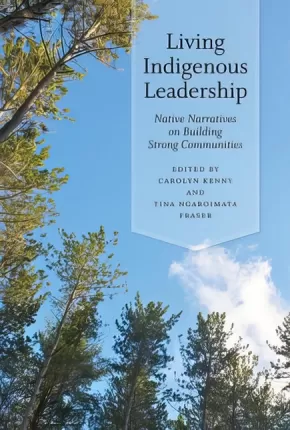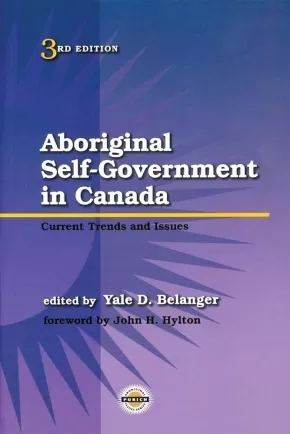
Leadership
1
-
15
of
39 Results;
Sort By
Go To
of 3
Indigenous Voices: Inspiring & Empowering Quotes from Global Thought Leaders
$25.99
Format:
Hardcover
Text Content Territories:
Indigenous Canadian; Indigenous American; Indigenous South American;
Reading Level: N/A
ISBN / Barcode: 9781577154914
Synopsis:
Synopsis:
Immerse yourself in Indigenous Voices, an inspiring volume of quotations by Indigenous thought leaders, activists, politicians, and scholars illustrated with stunning artwork by Indigenous artists.
This captivating book weaves together the timeless wisdom of Indigenous people from various nations and regions through a mosaic of more than 60 quotes, words, and stories by elders, leaders, activists, scholars, and influential contemporaries spanning all walks of life. Discover the diverse and unique heritage of extraordinary people like:
- Shina Novalinga – A member of the Inuk living in Montreal, Canada, Shina Novalinga is a content creator, singer, and activist who shares her Inuk culture across social media, of which an important aspect is traditional throat singing with her mother.
- Natali Segovia – A member of the Quechua, Natali Segovia is the Executive Director of the Water Protector Legal Collective and a human rights attorney. Her advocacy focuses on defending Water Protectors and human rights defenders facing repression for their activism.
- Corrina Gould – Of the Ohlone, Corrina Gould is the chair and spokesperson for the Confederated Villages of Lisjan, the Co-Director for the Sogorea Te' Land Trust, and the lead organizer for Indian People Organizing for Change.
- Elias Not Afraid – A member of the Apsáalooke (Crow), Elias Not Afraid is a mega-award-winning queer beader and fashion designer. He says, “When people think of native beadwork, they think trinkets and good luck charms and dream catchers but it’s far from it. I create wearable art that is durable and can be used daily and last over a lifetime and be used as a family heirloom.”
- Lily Gladstone – An American actress from the Blackfeet Reservation, Gladstone is of Piegan Blackfeet, Nez Perce, and European heritage. They earned critical acclaim for portraying Mollie Kyle, an Osage woman who survived the Osage Indian murders in Martin Scorsese’s film Killers of the Flower Moon, among other important roles in film and television.
- Kola Shippentower – A member of the Umatilla, Shippentower is the first Native American player for the Oregon Ravens, a tackle football team for women and non-binary players.
- Shiloh Maples – Of the Odawa, Maples is a citizen of the Little River Band of Indians based in Michigan. Through her interest in Indigenous food systems and her own Ojibwe and Odawa heritage, she developed the program Sacred Roots for the American Indian Health and Family Services in Detroit, where she taught cooking classes and promoted dishes using traditional, seasonal, and local ingredients in a way that improved participants’ health while connecting them with their culture.
- Alvera Sargent – Sargent, of the Akwesasne Mohawk, worked with the Akwesasne Freedom School, one of the oldest Indigenous language schools in North America. “My hope for our tribal community at large is that more of our people come back to our traditional space. I am grateful that our time has come as Indigenous people are being recognized for their traditional knowledge systems. The community is recognizing that Indigenous people do have the wisdom of our ancestors to share, which helps all areas of our society.”
- And more!
Indigenous Voices offers a unique opportunity to connect with ancient traditions, refresh your perspective with modern insight, and gain awareness and understanding that resonate across cultures and generations.
Additional Information
192 pages | 7.5" x 8.6" | Hardcover
The Many Names of Robert Cree: How a First Nations Chief Brought Ancient Wisdom to Big Business and Prosperity to His People
$26.95
Format:
Paperback
Reading Level: N/A
ISBN / Barcode: 9781770418301
Synopsis:
Synopsis:
A vital account of the life and many names of Robert Cree, and his plan for a peaceful, sincere, and just path to reconciliation in an angry and chaotic world.
His mother called him “Bobby Mountain.” Elders called him “Great Man.” His people called him “Chief.” Oil men called him “Mr. Cree.” But the government called him “Number 53.” Robert Cree was all of these while facing his people’s oppressors and freeing the ghosts of tortured spirits.
The Many Names of Robert Cree is his first-person account of survival in a brutally racist residential school system designed to erase traditional Indigenous culture, language, and knowledge. It is also the story of an epic life of struggle and healing, as Cree takes the wisdom of his ancestors and a message of reconciliation to the halls of government and to industry boardrooms.
In the storytelling tradition of his people, Cree recounts his early years in the bush, his captivity at a residential school, his struggles with addiction, his political awakening as one of Canada’s youngest First Nation Chiefs, and the rising Indigenous activism of the late 20th and early 21st centuries. He also recounts the oil industry’s arrival on his poverty-stricken reserve and the ensuing struggle to balance economic opportunity with environmental challenges.
Throughout, Cree’s leadership is rooted in his unshakable commitment to the sacred traditional teachings of his people. His beliefs give him the strength to focus on hope, dignity, and building a better future for his community. Now a respected Elder and spiritual leader, Cree champions forgiveness as a powerful force that can bring healing and transformation for all.
Additional Information
264 pages | 6" x 9" | Paperback
Still Ruffling Feathers: Let Us Put Our Minds Together
$24.95
Format:
Paperback
Text Content Territories:
Indigenous Canadian; First Nations; Cree (Nehiyawak); Plains Cree; Red Pheasant Cree Nation;
Reading Level: N/A
ISBN / Barcode: 9781772841183
Synopsis:
Synopsis:
Revisiting the political activism of WIC Wuttunee
William (Bill) Wuttunee was a trailblazing lawyer, a courageous native rights activist; and one of the architects of the process for the Truth and Reconciliation Commission. His 1971 book, Ruffled Feathers: Indians in Canadian Society, decried conditions on reserves and pressed for integration-on Indigenous peoples' own terms-supporting many of the aims of the Trudeau government's 1969 "White Paper." Though controversial at the time, Wuttunee's arguments were rooted in a foundational belief in the strengths of his people and a steadfast rejection of victimhood. In the fifty years that have followed its publication, Ruffled Feathers has been largely forgotten, though ideas that Wuttunee put forth-ending the Indian Act and the reserve system-continue to find space within contemporary Canadian political discourse.
In this volume, editor Wanda Wuttunee gathers a diverse cohort of scholars to engage with her father's ideas and offer their own perspectives on the opportunities and challenges facing Indigenous peoples in Canada, then and now. Favouring discourse over conclusions, Still Ruffling Feathers leads the reader to a nuanced understanding of the ongoing conversations and unresolved issues stemming from the Indian Act and invites us to envision miyo-pimâtisiwin, "the good life."
Reviews"
"Still Ruffling Feathers explores an important area of modern history on Indigenous leadership. The thoughts and ideas expressed by William Wuttunee still have resonance today." - Dr. Brian Caillou, University of Calgary
Educator Information
Table of Contents
Brotherhood by William I.C. Wuttunee
Acknowledgements
Contributors
Introduction by Wakchan (Wanda Wuttunee), Red Pheasant Cree Nation, Saskatchewan
Chapter 1. Reflections on a Legacy--An Eagle Eye Perspective by Wakchan (Wanda Wuttunee), Red Pheasant Cree Nation, Saskatchewan
Chapter 2. Still Ruffling Feathers Too--More than 50 Years Later by Makookins (Xakiji (Chief) Lee Crowchild), Tsuut'ina Nation, Alberta
Chapter 3. William Wuttunee--Ruffling Feathers in "Indian" Time and Space by Thohahoken (Michael Doxtater), Mohawk Turtle Clan Family of Satekariwate, Ontario
Chapter 4. Learning to Straighten Our Ruffled Feathers: An Education by Askîy Pihêsiw (Robert Falcon Ouelette), Red Pheasant Cree Nation, Saskatchewan
Chapter 5. Ruffled Feathers: A Critical Assessment by Bush Doctor (Peter Kulchyski), Bissett, Manitoba
Chapter 6. Final Thoughts--Debating Our Future, Coming to One Mind by David Newhouse, Onandaga, Six Nations of the Grand River, Ontario.
Appendix A: Excerpts from Ruffled Feathers (1971) by William I.C. Wuttunee
Appendix B. Selected Poetry of William I. C. Wuttunee
Appendix C. Discussion Questions Bibliography
Additional Information
204 pages | 5.50" x 8.50" | Paperback
Read This When Things Fall Apart: Letters to Activists in Crisis
$27.95
Editors:
Format:
Paperback
Text Content Territories:
Indigenous Canadian; Indigenous American;
Reading Level: N/A
ISBN / Barcode: 9781849355841
Synopsis:
Synopsis:
A bundle of letters to activists and organizers on the frontlines in catastrophic times from Let This Radicalize You co-author Kelly Hayes.
In social movements, some heartbreaks are all but inevitable. Campaigns will be lost. Mental health crises will occur. Social ills, like gender-based violence, will manifest themselves in movement spaces. People will experience profound personal losses. Grief, alienation, and despair can grind us under. Sometimes, we need accompaniment. Sometimes, we need to be met where we’re at by a caring voice of experience. Read This When Things Fall Apart is a care package for activists and organizers building power under fascistic, demoralizing conditions. It’s an outstretched hand, offering history lessons, personal anecdotes, and practical advice about how to navigate the woes of justice work. A survival guide for the heart, this is a book for activists to keep close, and to share with co-strugglers in need.
Personal, reflective, and hopeful, Read This When Things Fall Apart harnesses the writers' individual moments of despair into living, breathing wisdom that chips away at the supposed inevitability of fascist life. Restorative like a letter from a trusted friend and invigorating like a story from a mentor, the book is an indispensable companion for all of us navigating challenging times. Featuring letters from Mariame Kaba, Ashon Crawley, Leanne Betasamosake Simpson, Leah Lakshmi Piepzna-Samarasinha, Eman Abdelhadi, Brian Merchant, and more.
Reviews
"This marvelous book is essential reading for the times we find ourselves in."—Chanda Prescod-Weinstein, author of The Disordered Cosmos: A Journey into Dark Matter, Spacetime, and Dreams Deferred
"What a gift! We all need these letters, not just in times of crisis or defeat. It is the only book you’ll hold that will hold you, free you, permit you to fail, rest, retreat, grieve, live, laugh, fight, and heal—to be human. This book must never go out of print." —Robin D. G. Kelley, author of Freedom Dreams: The Black Radical Imagination
"Read this When Things Fall Apart is a balm of these dark times. This is the book I wish I'd had as a young organizer. It is a necessary text that sent me through the full kaleidoscope of emotions—spanning rage, laughter, and sadness—but more importantly, helped ground me in times of crisis and unrelenting brutality." —Robyn Maynard, co-author of Rehearsals for Living
“If you need an antidote to despair, this book is for you. It’s a repository of fortifying collective wisdom, a tonic for our troubled times. The letters Kelly Hayes has collected offer vital insights amid the darkness, shrewd strategic advice for aspiring change-makers, and a reminder none of us are in the fight alone.” —Astra Taylor, co-author of Solidarity: The Past, Present, and Future of a World-Changing Idea
“For years I've had a saying: resist the pleasures of doom. It can feel perversely good to tell ourselves that the situation is so bad we simply can't do anything, to throw up our hands and give up. This book is an antidote to the pleasures of doom—it offers the deeper, more sustaining pleasure of solidarity, in beautiful specificity, from committed organizers in a variety of movements. They have felt despair, stared into the void of defeat, and they share concrete advice about the ways we can keep going when all feels hopeless. This book is a profound act of care.” —Sarah Jaffe, author of From the Ashes: Grief and Revolution in a World on Fire
“Read this When Things Fall Apart: Letters to Activists in Crisis is a signpost for activists who feel unsettled about themselves and the future. The contributors offer their truths and wisdom with raw vulnerability. Read this When Things Fall Apart is a resource for anyone who believes hope will guide us through the darkest of times.” —Alice Wong, editor of Disability Intimacy: Essays on Love, Care, and Desire
"These letters are like seeds in a pomegranate—gorgeous gems full of nourishment, nestled together, shaped by one another, juicy, sweet and alive. The intimacy and urgency of these wise messages, written by people who have given so much to our movements and seen so much, is just what we need right now, in harrowing times, to help new people cross the threshold to collective action and to bolster the spirits of all who continue to press on, against difficult odds. I cannot wait to give this book to my students and the people I've been working with for decades. We all need what is in here." —Dean Spade, author of Mutual Aid: Building Solidarity During This Crisis (and the Next)
“In this time of monsters burying us in grief and despair, this extraordinary collection is a steady hand with advice, analysis and affirmation. Each generous and generative letter centers our love for ourselves and our people as methodology. This book is a compelling reminder that we need each other as comrades and community, that we all have gifts to contribute to movements, and that—through uncertainty and one million experiments—we will win.” —Harsha Walia, author of Border and Rule: Global Migration, Capitalism, and the Rise of Racist Nationalism
Additional Information
172 pages | 5.50" x 8.50" | Paperback
The Story of ii' taa'poh'to'p: University of Calgary's Journey Towards an Indigenous Strategy
$34.99
Format:
Paperback
Text Content Territories:
Indigenous Canadian;
Reading Level: N/A
ISBN / Barcode: 9781773856285
Synopsis:
Synopsis:
A dynamic framework for the development of an Indigenous strategy that shares the engaging story of ii’taa’poh’to’p at the University of Calgary.
The University of Calgary’s Indigenous strategy, ii’taa’poh’to’p, lays the path for a journey of transformation and renewal for truth and reconciliation through ways of knowing, doing, connecting, and being.
The Story of ii’ taa’poh’to’p is the story of the creation of the University of Calgary’s Indigenous Strategy. The result of an enlightening process of relationship building and deep learning and listening, it required the intentional and careful creation of parallel paths for institutional and Indigenous frameworks to create the strategy. Authentic conversations occurred in the ethical space between the parallel paths, allowing for increased understanding of differences and similarities between cultures.
This book captures powerful and emotional stories that emphasize the importance of reconciliation and decolonizing organizations. It demonstrates that trusting relationships can be developed between Indigenous and non-Indigenous relatives and lays out a dynamic framework and approach for the development of an Indigenous strategy.
The Grandparents of ii’ taa’poh’to’p welcome readers to learn from their experience. They share insightful lessons about the importance of being relational; honouring ways of knowing and doing from other cultures; developing generational strategies that persist over time; understanding the impacts of fear; and making assumptions about people’s prior knowledge. They discuss how relationship building through deep listening across cultures is essential to the development of an Indigenous strategy. The Story of ii’ taa’poh’to’p is essential reading for all those interested in the development of an Indigenous strategy in the pursuit of truth and reconciliation.
Educator Information
About the Authors: The Grandparents of ii ’taa’poh’to’p are a collective of leaders from diverse cultural backgrounds and experiences who guided the development of the Indigenous strategy at the University of Calgary.
Additional Information
176 pages | 6.00" x 9.00" | Paperback
21 Things You Need to Know About Indigenous Self-Government: A Conversation About Dismantling the Indian Act
$24.95
Format:
Paperback
Text Content Territories:
Indigenous Canadian;
Grade Levels: 12; University/College;
ISBN / Barcode: 9781774586273
Synopsis:
Synopsis:
From the bestselling author of 21 Things™ You May Not Know About the Indian Act comes a powerful new book on dismantling the Indian Act and advancing Indigenous self-governance.
Bob Joseph’s 21 Things™You May Not Know About the Indian Act captured the attention of hundreds of thousands of Canadians by shining a light on the Indian Act and the problems associated with it. In that book, readers learned that the Consolidated Indian Act of 1876 has controlled the lives of Indigenous Peoples in Canada for generations, and despite its objective to assimilate Indians into the economic and political mainstream, it has had the opposite effect: segregation. They live under different laws and on different lands.
People came away from that book with questions such as "Can we get rid of the Indian Act?" and "What would that look like? Would self-government work?" These are timely questions, given that 2026 will mark 150 years since the Consolidated Indian Act of 1876. The short answer to these questions is, yes, we can dismantle the Act, and there are current examples of self-government arrangements that are working.
With his trademark wisdom, humility, and deep understanding, Bob Joseph shows us the path forward in 21 Things™ You Need to Know About Indigenous Self-Government: A Conversation About Dismantling the Indian Act, in which Indigenous self-governance is already happening and not to be feared—and negotiating more such arrangements, sooner rather than later, is an absolute necessity.
21 Things™ You Need to Know About Indigenous Self-Government: A Conversation About Dismantling the Indian Act is a call to action. Join the conversation now.
Additional Information
200 pages | 5.00" x 8.00" | Paperback
When No Thing Works: A Zen and Indigenous Perspective on Resilience, Shared Purpose, and Leadership in the Timeplace of Collapse
$24.95
Format:
Paperback
Text Content Territories:
Indigenous Polynesian; Indigenous Hawaiian;
Reading Level: N/A
ISBN / Barcode: 9798889840992
Synopsis:
Synopsis:
Spiritual and community lessons for embracing collective care, co-creating sustainable worlds, and responsibly meeting uncertain futures—a Zen and Indigenous take on building better, more balanced ways of being
Talking story, weaving poetry, and offering wisdom at the intersections of strategy, politics, and spiritual activism, When No Thing Works is a visionary guide to co-creating new worlds from one in crisis. It asks into the ways we can live well and maintain our wholeness in an era of collective acceleration: the swiftly moving current, fed and shaped by human actions, that sweeps us toward ever uncertain futures. Grounded in Zen Buddhism, interconnection, and decades of community activism, When No Thing Works explores questions like:
- As we stand at a threshold of collective change, what leaps must we make?
- How can we push through discord and polarization and meet these critical changepoints collectively?
- What practices, strategies, and spiritualities can align to vision a sustainable future for our communities and descendants?
- How can we step out of urgency to tend to our crises with wisdom, intention, and care?
With wise and witty prose that wanders and turns, guides and reveals, Zen master and Indigenous Hawaiian leader Rōshi Norma Wong’s meditation holds our collective moment with gravity and tender care. She asks us to not only imagine but to live into a story beyond crisis and collapse—one that expands to meet our dreams of what (we hope) comes next, while facing with clarity and grace our here and now in the world we share today.
Reviews
“Norma Ryuko Kawelokū Wong explores the essence of a twenty-first-century Indigenous worldview in When No Thing Works. She relies on knowing that all things, past and future, are in relationship. What we imagine and how we walk in the present determines the future. As Norma signals, our walk must include leaps that take us into unknowns, but we will not be alone. Norma gives us wise counsel for this difficult moment on Mother Earth. One culture, one belief system, one community alone is unable to fulfill our ancestors’ collective hopes for all of our descendants. As Norma’s ancestors said, ‘O ka ehu kakahiaka . . . The red dawn of our people became the red dawn of many peoples.’ Hawwih (thank you in Caddo), Norma, your family, and your people!”—Judith LeBlanc, citizen of the Caddo Nation, ekah (grandmother), and executive director of the Native Organizers Alliance
“As we stand at the threshold of collapsing systems and broken hearts, there is an opening. In When No Thing Works, Rōshi Norma Wong gives us a compass for how to navigate the space in between where we are coming from and where we are going. This book is an invitation to practice who we need to be to meet this moment and shape a future of possibility and potential.”—Kerri Kelly, author of American Detox
Additional Information
120 pages | 5.51" x 8.51" | 6 b&w photos | Paperback
The Warrior Within: Own Your Power to Serve, Fight, Protect, and Heal
$39.00
Format:
Hardcover
Text Content Territories:
Indigenous American; Native American;
Reading Level: N/A
ISBN / Barcode: 9780593423011
Synopsis:
Synopsis:
A transformational guide to getting yourself right in order to accomplish the work you were meant to do, from speaker, former U.S. Air Force officer, and member of the Ottawa tribe D.J. Vanas.
When faced with an important job, and people depending on you to do it, most of us will give and give until there’s nothing left. But running on empty, even for a worthy cause, only sets you up for failure in the long run. To persevere on the path to success requires more than sheer fearlessness and willpower. It requires what D.J. Vanas calls the warrior spirit, the kind of strength that looks outward but comes from deep within.
Drawing inspiration from Native American philosophy and tradition, The Warrior Within outlines a new model for personal power in the face of overwhelming chaos. A true warrior is not the toughest or bravest person in the room. A true warrior is committed to self-mastery, knows how to navigate change and disruption, transforms setbacks into opportunities for achievement, refuses to quit, and most importantly, always fights for something bigger than the self. With a vast array of stories and examples, from vision quests to treacherous hikes to veterans and service providers at the front lines, Vanas shows how to apply these principles to transform how you show up both for yourself and those around you.
More than an empowerment manual, The Warrior Within is a call to accomplish the world-changing work you were meant for by tapping into the power of the warrior spirit.
Reviews
"The powerful lessons imparted in these chapters will inspire strength, confidence and motivation, so that you can deliver your best in the worst of circumstances—while keeping your sanity and health! I encourage every healthcare giver to read The Warrior Within, for they truly serve, fight, protect and heal every day, often at their own expense."--LeAnn Thieman, author of the Chicken Soup for Nurse’s Soul series and founder of SelfCare for HealthCare®
"I highly recommend The Warrior Within! Through great storytelling, D.J. Vanas shares an often overlooked element of leadership ... taking care of yourself. Our beautiful Anishinaabe teachings emphasize balance in all things. Being a warrior means recognizing your needs and honoring your gifts. Way to go, D.J.!"--Angeline Boulley (Sault Ste. Marie Tribe of Chippewa Indians) New York Times bestselling author of Firekeeper's Daughter
"D.J. Vanas inspires us to find our ‘warrior spirit’ of courage, perseverance, resilience, and teamwork in life’s most fearful times. Your heart will soar like an eagle as you read how ordinary heroes use this inner strength to serve others—and how we can learn to do the same.”--Joseph Pfeifer, FDNY Assistant Chief, retired, author of Ordinary Heroes
“This is it: the book I’ve been waiting for! There isn’t another on the market that applies indigenous principles and ideas in order to expose the warrior in you. A comprehensive, compelling, emotional and amazingly insightful book. I couldn’t put it down. I wish I had this book years ago!"--Juanita Mullen (Seneca), AI/AN Veterans Liaison, Department of Veterans Affairs
“DJ Vanas describes a life of leading and doing through Indigenous identity and values. Combining his personal story with advice, The Warrior Within is more than a leadership book. It is a story of living a life of abundance and rich relationships, with DJ as your terrific guide.”-Cheryl Crazy Bull, President & CEO, American Indian College Fund
Additional Information
256 pages | 5.72" x 8.57" | Hardcover
Hòt'a! Enough!: Georges Erasmus's Fifty-Year Battle for Indigenous Rights
$28.99
Format:
Paperback
Text Content Territories:
Indigenous Canadian; First Nations; Dene;
Reading Level: N/A
ISBN / Barcode: 9781459752900
Synopsis:
Synopsis:
The political life of Dene leader Georges Erasmus - a radical Native rights crusader widely regarded as one of the most important Indigenous leaders of the past fifty years.
For decades, Georges Erasmus led the fight for Indigenous rights. From the Berger Inquiry to the Canadian constitutional talks to the Oka Crisis, Georges was a significant figure in Canada's political landscape. In the 1990s, he led the Royal Commission on Aboriginal Peoples and afterward was chair and president of the Aboriginal Healing Foundation, around the time that Canada's residential school system became an ongoing frontpage story.
Georges's five-decade battle for Indigenous rights took him around the world and saw him sitting across the table from prime ministers and premiers. In the 1980s, when Georges was the National Chief of the Assembly of First Nations, he was referred to as the "Thirteenth Premier." This book tells the personal story of his life as a leading Indigenous figure, taking the reader inside some of Canada's biggest crises and challenges.
Awards
- 2025 Indigenous Voices Awards - Prose in English Award
Additional Information
320 pages | 6.00" x 9.00" | 57 b&w illustrations | Paperback
True Reconciliation: How to Be a Force for Change (PB)
$23.00
Format:
Paperback
Text Content Territories:
Indigenous Canadian;
Reading Level: N/A
ISBN / Barcode: 9780771004407
Synopsis:
Synopsis:
There is one question Canadians have asked Jody Wilson-Raybould more than any other: What can I do to help advance reconciliation? It is clear that people from all over the country want to take concrete and tangible action that will make real change. We just need to know how to get started. This book provides that next step. For Wilson-Raybould, what individuals and organizations need to do to advance true reconciliation is self-evident, accessible, and achievable. True Reconciliation is broken down into three core practices—Learn, Understand, and Act—that can be applied by individuals, communities, organizations, and governments.
The practices are based not only on the historical and contemporary experience of Indigenous peoples in their relentless efforts to effect transformative change and decolonization, but also on the deep understanding and expertise about what has been effective in the past, what we are doing right, and wrong, today, and what our collective future requires. Fundamental to a shared way of thinking is an understanding of the Indigenous experience throughout the story of Canada. In a manner that reflects how work is done in the Big House, True Reconciliation features an “oral” history of these lands, told through Indigenous and non-Indigenous voices from our past and present.
The ultimate and attainable goal of True Reconciliation is to break down the silos we’ve created that prevent meaningful change, to be empowered to increasingly act as “inbetweeners,” and to take full advantage of this moment in our history to positively transform the country into a place we can all be proud of.
Additional Information
352 pages | 5.17" x 7.99" | Paperback
When the Pine Needles Fall: Indigenous Acts of Resistance
$32.95
Format:
Paperback
Text Content Territories:
Indigenous Canadian; First Nations; Haudenosaunee (Iroquois); Kanyen'keha:ka (Mohawk); Kanehsatà:ke; Kahnawà:ke ;
Reading Level: N/A
ISBN / Barcode: 9781771136501
Synopsis:
Synopsis:
There have been many things written about Canada’s violent siege of Kanehsatà:ke and Kahnawà:ke in the summer of 1990, but When the Pine Needles Fall: Indigenous Acts of Resistance is the first book from the perspective of Katsi’tsakwas Ellen Gabriel, who was the Kanien’kehá:ka (Mohawk) spokesperson during the siege. When the Pine Needles Fall, written in a conversational style by Gabriel with historian Sean Carleton, offers an intimate look at Gabriel’s life leading up to the 1990 siege, her experiences as spokesperson for her community, and her work since then as an Indigenous land defender, human rights activist, and feminist leader.
More than just the memoir of an extraordinary individual, When the Pine Needles Fall offers insight into Indigenous language, history, and philosophy, reflections on our relationship with the land, and calls to action against both colonialism and capitalism as we face the climate crisis. Gabriel’s hopes for a decolonial future make clear why protecting Indigenous homelands is vital not only for the survival of Indigenous peoples, but for all who live on this planet.
Awards
- 2025 Canadian Historical Association Indigenous History Book Prize
- 2025 Errol Sharpe Book Prize
- 2025 Wilson Institute Book Prize
Reviews
“When the Pine Needles Fall is a profound treatise and manifesto chronicling Haudenosaunee resistance to land theft by one of the most important Land Defenders of our time. Gabriel’s work is the book on Indigenous resistance I’ve been waiting for my whole life. It is a must-read for anyone concerned with the continuation of life on this planet.” — Leanne Betasamosake Simpson, co-author of “Rehearsals for Living”
“Katsi’tsakwas Ellen Gabriel’s words in When the Pine Needles Fall are gifts that serve as a beacon of light by igniting our hearts, minds, and spirits. Through her boundless wisdom grounded in healing work as a Land Defender on Turtle Island, she calls for fierce Indigenous resistance and radical global solidarity to put an end to root causes of oppression worldwide: capitalism, patriarchy, and settler colonialism. Gabriel reminds us that a more just, kind, and caring world—where all life is precious—is possible for the next seven generations, but only if we fight for it.” — Samir Shaheen-Hussain, MD, author of “Fighting for A Hand to Hold: Confronting Medical Colonialism against Indigenous Children in Canada”
“When the Pine Needles Fall is a remarkable and revelatory account of the 1990 siege of Kanehsatà:ke and Kahnawà:ke, when provincial, municipal, and national armed forces targeted these Mohawk communities. It is also one of the best first-hand accounts of Indigenous activism that I have ever read, relayed in moving and extraordinary form. An essential addition to contemporary First Nations history and the growing field of Indigenous Studies.” — Ned Blackhawk, Western Shoshone, author of “The Rediscovery of America: Native Peoples and the Unmaking of U.S. History”
“As a treatise on women and culture-based governance from a remarkable Haudenosaunee leader, When the Pine Needles Fall offers me hope and renewed energy. Through her life work, Ellen Gabriel demonstrates how to persevere, remain optimistic, and continue with creative and activist endeavours. The book effectively situates the ‘crisis’ within its centuries-long context, marking a tipping point for Canada while highlighting ongoing challenges. It also examines how mainstream narratives are constructed around Indigenous struggles, providing a comprehensive profile of Gabriel’s diverse contributions to Indigenous resistance and resurgence.” — Kim Anderson, author of“ Life Stages and Native Women: Memory, Teachings, and Story Medicine”
“Katsi’tsakwas Ellen Gabriel’s personal account of the 1990 siege of Kanehsatà:ke and Kahnawà:ke is a crucial contribution to our understanding of these dramatic events and of the political context of the time. Her lifetime dedication to the defence of Indigenous peoples and women’s rights is truly exemplary and constitutes an inspiration for generations to come.” — Bernard Duhaime, professor, Faculty of Political Science and Law, Université du Québec à Montréal
“In When the Pine Needles Fall, celebrated activist Katsi’tsakwas Ellen Gabriel gifts us with an expansive account of the 1990 siege of Kanehsatà:ke and Kahnawà:ke. This alone provides a captivating analysis of this seminal moment and its legacy within larger movements for Indigenous sovereignty on Turtle Island. But Gabriel, an artist, also paints the negative space, braiding her relationship to the land, Kanien’kehá:ka teachings, and the language with her tireless work against settler colonialism, extractive capitalism, and patriarchy. This essential book is an inspiring conversation reminding us that decolonization is world-building rooted in an ethics of relationality and care.” — Nazila Bettache, MD, MPH; assistant professor of medicine, Université de Montréal; social justice organizer and co-editor of “Reflections on Illness”
“I honour my sister whose words speak the truth. One of the most powerful quotes by Katsi’tsakwas is: ‘I’m a Kanien’kehá:ka woman who cares deeply about our land and I want a better future for the generations to come.’ Everything she speaks about in this book is directly connected to these words.” — Beverley Jacobs, CM, LLB, LLM, PhD; Kanien’kehá:ka, Bear Clan, Six Nations Grand River Territory; associate professor, Faculty of Law, University of Windsor
Additional Information
280 pages | 5.50" x 8.50" | Paperback
It Stops Here: Standing Up for Our Lands, Our Waters, and Our People (PB)
$24.00
Format:
Paperback
Text Content Territories:
Indigenous Canadian; First Nations; Salish; Coast Salish; Tsleil-Waututh;
ISBN / Barcode: 9780735242821
Synopsis:
Synopsis:
A personal account of one man’s confrontation with colonization that illuminates the philosophy and values of a First Nation on the front lines of the fight against an extractive industry, colonial government, and threats to the life-giving Salish Sea.
It Stops Here is the profound story of the spiritual, cultural, and political resurgence of a nation taking action to reclaim their lands, waters, law, and food systems in the face of colonization. In deeply moving testimony, it recounts the intergenerational struggle of the Tsleil-Waututh Nation to overcome colonial harms and the powerful stance they have taken alongside allies and other Indigenous nations across Turtle Island against the development of the Trans Mountain Pipeline—a fossil fuel megaproject on their unceded territories.
In a firsthand account of the resurgence told by Rueben George, one of the most prominent leaders of the widespread opposition to the Trans Mountain Pipeline expansion, It Stops Here reveals extraordinary insights and revelations from someone who has devoted more than a decade of his life to fighting the project. Rueben shares stories about his family’s deep ancestral connections to their unceded lands and waters, which are today more commonly known as Vancouver, British Columbia and the Burrard Inlet. He discloses how, following the systematic cultural genocide enacted by the colonial state, key leaders of his community, such as his grandfather, Chief Dan George, always taught the younger generations to be proud of who they were and to remember the importance of their connection to the inlet.
Part memoir, part call to action, It Stops Here is a compelling appeal to prioritize the sacred over oil and extractive industries, while insisting that settler society honour Indigenous law and jurisdiction over unceded territories rather than exploiting lands and reducing them to their natural resources.
Additional Information
288 pages | 5.13" x 7.98" | 31 b+w images throughout | Paperback
Women of the Métis Nation
$30.00
Editors:
Text Content Territories:
Indigenous Canadian; Métis;
Reading Level: N/A
ISBN / Barcode: n/a
Synopsis:
Synopsis:
Métis Women are the heart and soul of the Métis people. Without them, there would be no Métis Nation. They are the strength behind our families, communities, and places of work. In the past, their kinship networks established where people settled and whom people married. Sovereign within their familial and community roles, they were the healers, the stewards of the land and its resources, the keepers of Indigenous knowledge, and the midwives who kept the Métis Nation nurtured, educated, and sustained. This tradition has continued into the present as Métis women have moved past their domestic and familial spheres into areas such as social advocacy, the arts, sports, law, post-secondary education, and entrepreneurship. Containing hundreds of biographies, Women of the Métis Nation is an ambitious role model book that documents more than 200 years of trailblazing Métis women.
Additional Information
235 Pages | Nonfiction
Tricky Grounds: Indigenous Women's Experiences in Canadian University Administration
$34.95
Format:
Paperback
Text Content Territories:
Indigenous Canadian; First Nations; Cree (Nehiyawak); Swampy Cree ; Mushkegowuk;
Reading Level: N/A
ISBN / Barcode: 9780889779778
Synopsis:
Synopsis:
Breaks the deafening silence of Indigenous women’s voices in academic leadership positions.
Since the 2015 release of the report on the Truth and Reconciliation Commission of Canada, new Indigenous policies have been enacted in universities and a variety of interconnecting Indigenous senior administrative roles have been created. Many of these newly created roles have been filled by Indigenous women. But what does it mean for Indigenous women to be recruited to Indigenize Western institutions that have not undergone introspective, structural change?
Informed by her own experiences and the stories of other Indigenous women working in senior administrative roles in Canadian universities, Candace Brunette-Debassige explores the triple-binding position Indigenous women often find themselves trapped in when trying to implement reconciliation in institutions that remain colonial, Eurocentric, and male-dominated. The author considers too the gendered, emotional labour Indigenous women are tasked with when universities rush to Indigenize without the necessary preparatory work of decolonization.
Drawing on an Indigenous feminist decolonial theoretical lens and positioning Indigenous story as theory, Brunette-Debassige illustrates how Indigenous women can and do preserve and enact their agency through resistance, and help lead deeper transformative changes in Canadian universities. Ultimately, her work provides a model for how reconciliation and Indigenization can be done at an institutional level.
Reviews
“This book helped me make sense of the ‘trickiness’ of my own experiences as an Indigenous woman in Canadian universities.” —Kim Anderson, University of Guelph
Additional Information
320 pages | 6.00" x 9.00" | Paperback
Muiwlanej kikamaqki - Honouring Our Ancestors: Mi'kmaq Who Left a Mark on the History of the Northeast, 1680 to 1980
$150.00
Editors:
Format:
Hardcover
Text Content Territories:
Indigenous Canadian; First Nations; Mi'kmaq;
Reading Level: N/A
ISBN / Barcode: 9781487546137
Synopsis:
Synopsis:
Drawing upon oral and documentary evidence, this volume explores the lives of noteworthy Mi’kmaw individuals whose thoughts, actions, and aspirations impacted the history of the Northeast but whose activities were too often relegated to the shadows of history.
The book highlights Mi’kmaw leaders who played major roles in guiding the history of the region between 1680 and 1980. It sheds light on their community and emigration policies, organizational and negotiating skills, diplomatic endeavours, and stewardship of land and resources. Contributors to the volume range from seasoned scholars with years of research in the field to Mi’kmaw students whose interest in their history will prove inspirational. Offering important new insights, the book re-centres Indigenous nationhood to alter the way we understand the field itself. The book also provides a lengthy index so that information may be retrieved and used in future research.
Muiwlanej kikamaqki – Honouring Our Ancestors will engage the interest of Indigenous and non-Indigenous readers alike, engender pride in Mi’kmaw leadership legacies, and encourage Mi’kmaw youth and others to probe more deeply into the history of the Northeast.
Reviews
"This book is an invaluable and original offering. Muiwlanej kikamaqki – Honouring Our Ancestors makes a significant contribution to Mi’kmaq history by successfully bringing little-known individuals into the light and by placing them in a historical context that is uniquely informed by both written and oral narratives. For Mi’kmaq wanting to know more about their history, this book will be a wonderful source." - Natasha Simon, Nihkanatpat (Director) of the Mi’kmaq-Wolastoqey Centre, University of New Brunswick
"This book is deeply researched, both in written sources and in integrating the invaluable evidence of Indigenous knowledge. The detailed individual and family histories are uniquely effective in bringing out both changes and continuities in Mi’kmaw history and in the texture of Mi’kmaw interactions with non-Indigenous sojourners and settlers. With a remarkable and outstanding depth of scholarship, the book meticulously pursues biography as an approach that can be extended to people whose lives have too often been deemed to be insufficiently documented for conventional purposes, in order to take our historical understanding in innovative and productive directions."- John Reid, Professor of History, Saint Mary’s University
Additional Information
1004 pages | 8.00" x 10.00"| 62 b&w illustrations | Hardcover
Life in the City of Dirty Water: A Memoir of Healing (PB)
$19.95
Format:
Paperback
Text Content Territories:
Indigenous Canadian; First Nations; Cree (Nehiyawak); Swampy Cree ; Mathias Colomb First Nation;
ISBN / Barcode: 9780735240087
Synopsis:
Synopsis:
An electrifying memoir that braids together the urgent issues of Indigenous rights and environmental policy, from a nationally and internationally recognized activist and survivor.
There have been many Clayton Thomas-Mullers: The child who played with toy planes as an escape from domestic and sexual abuse, enduring the intergenerational trauma of Canada's residential school system; the angry youngster who defended himself with fists and sharp wit against racism and violence, at school and on the streets of Winnipeg and small-town British Columbia; the tough teenager who, at 17, managed a drug house run by members of his family, and slipped in and out of juvie, operating in a world of violence and pain.
But behind them all, there was another Clayton: the one who remained immersed in Cree spirituality, and who embraced the rituals and ways of thinking vital to his heritage; the one who reconnected with the land during summer visits to his great-grandparents' trapline in his home territory of Pukatawagan in northern Manitoba.
And it's this version of Clayton that ultimately triumphed, finding healing by directly facing the trauma that he shares with Indigenous peoples around the world. Now a leading organizer and activist on the frontlines of environmental resistance, Clayton brings his warrior spirit to the fight against the ongoing assault on Indigenous peoples' lands by Big Oil.
Tying together personal stories of survival that bring the realities of the First Nations of this land into sharp focus, and lessons learned from a career as a frontline activist committed to addressing environmental injustice at a global scale, Thomas-Muller offers a narrative and vision of healing and responsibility.
Reviews
“Clayton Thomas-Müller—Cree poet and environmental warrior dedicated to decolonization—has crafted an awesome, lyrical memoir that captures the experiences of urban Indigenous youth facing poverty, drugs, alcohol, domestic violence, and juvenile detention. Most, like Clayton, inherited the intergenerational trauma of residential schools. Clayton found a way to escape trauma and poverty in order to fight for his people. This beautifully written book is required reading for everyone who cares about justice for the survivors of genocide who continue to survive in colonized conditions. It offers a path to liberation that may also be the way to saving the earth and humanity itself.” — Roxanne Dunbar-Ortiz, author of An Indigenous Peoples’ History of the United States
“This book is an adventure story in every way. A life of drug dealers and crackhouses and guns; leaving that behind for a remarkable time of spiritual and personal growth; and there’s the ongoing adventure of working desperately to protect the planet and its sacred places. Clayton Thomas-Müller relates these adventures in ways that will help everyone through unfamiliar terrain—he’s a trustworthy guide and an authentic storyteller. In a moment when Indigenous people around the world are coming to the very fore of the most crucial fights, this volume will broaden your understanding in powerful ways. And you won’t forget its scenes any time soon.”—Bill McKibben, co-founder of 350.org and author of Earth and Oil and Honey
Additional Information
240 pages | 5.19" x 7.97" | Paperback
This Place Is Who We Are: Stories of Indigenous Leadership, Resilience, and Connection to Homelands
$39.95
Format:
Paperback
Text Content Territories:
Indigenous Canadian; First Nations; Kwakwaka'wakw (Kwakiutl); Ligwilda'wx (Laich-kwil-tach); Wei Wai Kai Nation; Dzwada’enuxw; Haida; Nuxalk (Bella Coola);
Reading Level: N/A
ISBN / Barcode: 9781990776137
Synopsis:
Synopsis:
This Place Is Who We Are profiles Indigenous communities in central and northern coastal BC that are reconnecting to their lands and waters—and growing and thriving through this reconnection.
Indigenous peoples and cultures are integrally connected to the land. Well-being in every sense—physical, social, environmental, economic, spiritual and cultural—depends on that relationship, which is based on a fundamental concept: when the land is well, so are the people.
With increasing strength, Indigenous peoples in this vast region of BC—which spans the homelands of more than two dozen First Nations and one of the largest remaining coastal temperate rainforests in the world—are restoring what has been lost through environmental depredation and healing what has been devastated by colonization.
This volume is a collection of ten of these inspiring stories. X̱aayda voices explain how their Rediscovery camps are healing and empowering their youth; Dzawada̱’enuxw Hereditary Chief Maxwiyalidizi K’odi Nelson shares the story of building a healing centre and ecolodge; Wei Wai Kum Chief Christopher Roberts describes the challenges and opportunities for an urban First Nation looking to prosper while protecting the environment and ancient Ligʷiłdaxʷ history and living cultural values; and many more Indigenous leaders share their own experiences of growth, strength and reconnection.
Thoughtful and inspiring, This Place Is Who We Are illustrates what can be accomplished when conservation and stewardship are inextricably intertwined with the prosperity and well-being of communities.
Reviews
“Katherine Palmer Gordon, a consummate listener, weaves a powerful tapestry of ten First Nations people, deeply grounded in land, memory and story. Their lives honour the inextinguishable inter-connectedness of humans and nature, in righteous defiance of colonization. These are stories that point to an optimistic future based on the teachings of Ancestors and Elders with a view to making the world better for children, grandchildren and children yet to come. To do this, human wellbeing and land protection must be inseparable. This book is an encounter with wonderful people doing wonderful things. This Place is Who We Are is an invitation to hope for a better society, a better world, featuring ten people creating it. I thank the contributors and Katherine Palmer Gordon for engaging in a visionary conversation.” — Shelagh Rogers, O.C. Host/Producer of The Next Chapter, CBC Radio One, Honorary Witness, Trut
“A beautiful collection of stories and lived experiences! Each with gentle and loving reminders of our sacred connections to each other, the land and water and all living beings. Individually, these stories are inspiring, hopeful and thought provoking. As a collection, majestically woven together by Katherine Palmer Gordon, they have the potential to change hearts and minds of readers, decision makers and future generations.” — Monique Gray Smith
“An astute facilitator of Indigenous governmental relationships and reconciliation, Katherine Palmer Gordon is also an award-winning writer, and a very good listener who earns trust. These deeply personal accounts of Indigenous cultural rediscovery, empowerment—and healing in a post-colonial world—are truly inspiring. Steeped in ancient connections with the land, the shared wisdom and vision of elders, youth and community leaders offer timely lessons for a healthier, more respectful relationship between people, wildlife and our planet. This is good medicine for all.” — Mark Forsythe, Co-author of The Trail of 1858: British Columbia's Gold Rush Past and former C
“Katherine Palmer Gordon, a consummate listener, weaves a powerful tapestry of ten First Nations people, deeply grounded in land, memory and story. Their lives honour the inextinguishable inter-connectedness of humans and nature, in righteous defiance of colonization. These are stories that point to an optimistic future based on the teachings of Ancestors and Elders with a view to making the world better for children, grandchildren and children yet to come. To do this, human wellbeing and land protection must be inseparable. This book is an encounter with wonderful people doing wonderful things. This Place is Who We Are is an invitation to hope for a better society, a better world, featuring ten people creating it. I thank the contributors and Katherine Palmer Gordon for engaging in a visionary conversation.” — Shelagh Rogers, O.C. Host/Producer of The Next Chapter, CBC Radio One, Honorary Witness, Trut
“A beautiful collection of stories and lived experiences! Each with gentle and loving reminders of our sacred connections to each other, the land and water and all living beings. Individually, these stories are inspiring, hopeful and thought provoking. As a collection, majestically woven together by Katherine Palmer Gordon, they have the potential to change hearts and minds of readers, decision makers and future generations.” — Monique Gray Smith
“An astute facilitator of Indigenous governmental relationships and reconciliation, Katherine Palmer Gordon is also an award-winning writer, and a very good listener who earns trust. These deeply personal accounts of Indigenous cultural rediscovery, empowerment—and healing in a post-colonial world—are truly inspiring. Steeped in ancient connections with the land, the shared wisdom and vision of elders, youth and community leaders offer timely lessons for a healthier, more respectful relationship between people, wildlife and our planet. This is good medicine for all.” — Mark Forsythe, Co-author of The Trail of 1858: British Columbia's Gold Rush Past and former C
Additional Information
256 pages | 8.00" x 10.00" | Paperback
256 pages | 8.00" x 10.00" | Paperback
Stoneface: A Defiant Dene
$28.00
Format:
Paperback
Text Content Territories:
Indigenous Canadian; First Nations; Dene;
Reading Level: N/A
ISBN / Barcode: 9781773861074
Synopsis:
Synopsis:
Stephen Kakfwi was born in a bush camp on the edge of the Arctic Circle in 1950. In a family torn apart by tuberculosis, alcohol and the traumas endured by generations in residential school, he emerged as a respected Dene elder and eventually the Premier of the Northwest Territories.
Stephen belongs to a cohort of young northerners who survived the childhood abuses of residential school only to find themselves as teenagers in another residential school where one Oblate father saw them as the next generation of leaders, and gave them the skills they would need to succeed. Kakfwi, schooled on civil rights and 1960s protest songs, dedicated himself to supporting chiefs in their claim to land that had been taken away from them and in their determination to seize control of the colonial political system.
Kakfwi’s life has been a series of diverse endeavours, blending traditional Dene practices with the daily demands of political office—hunting moose one day and negotiating with European diamond merchants the next. Throughout his career, Kakfwi understood that he held the power to make change—sometimes he succeeded, sometimes he did not. But he also embraced the power of story-telling, and has helped change the story of the North.
Kakfwi combines his remarkable memory for detail with his compelling raconteur’s skill in taking us through the incredible story of his life and one of the most transformative times in Canadian history. In his candid description of the loneliness of leadership and his embrace of Dene spirituality, Kakfwi’s Stoneface transforms politics into philosophy and an intensely personal guide to reconciliation.
Additional Information
240 pages | 6.00" x 9.00" | Paperback
The End of This World: Climate Justice in So-Called Canada
$25.95
Format:
Paperback
Text Content Territories:
Indigenous Canadian;
Reading Level: N/A
ISBN / Barcode: 9781771136129
Synopsis:
Synopsis:
The climate crisis is here, and the end of this world—a world built on land theft, resource extraction, and colonial genocide—is on the horizon. In this compelling roadmap to a livable future, Indigenous sovereignty and climate justice go hand in hand.
Drawing on their work in Indigenous activism, the labour movement, youth climate campaigns, community-engaged scholarship, and independent journalism, the six authors challenge toothless proposals and false solutions to show that a just transition from fossil fuels cannot succeed without the dismantling of settler capitalism in Canada. Together, they envision a near future where oil and gas stay in the ground; where a caring economy provides social supports for all; where wealth is redistributed from the bloated billionaire class; and where stolen land is rightfully reclaimed under the jurisdiction and sovereignty of Indigenous peoples.
Packed with clear-eyed analysis of both short- and long-term strategies for radical social change, The End of This World promises that the next world is within reach and worth fighting for.
Reviews
“The End of This World gifts readers with a mapping of a communal future grounded in Indigneous concepts of caring, relationship, solidarity, and a sharp analysis of the present. It is a gathering space, an experiment, and an invitation towards building formations of life outside of the cage of colonialism and capitalism. Engaging, timely, and crucial, I am so grateful this book exists, and for the futures it will inspire."— Leanne Betasamosake Simpson, co-author of “Rehearsals for Living”
"This book is a major and much-needed contribution to the climate conversation in Canada. The collective behind it embodies the very politics necessary to win a just transition that is worthy of the name: Indigenous-led, internationalist, rooted in solidarity, and crackling with moral clarity. The End of This World advances a holistic, radically reasonable vision of a future worth fighting for—and the authors have tallied the receipts for that glorious moment when the perpetrators of planetary arson get served the bill.”— Avi Lewis, co-author of “The Leap Manifesto”
Additional Information
240 pages | 5.50" x 8.50" | Paperback
I Will Live for Both of Us: A History of Colonialism, Uranium Mining, and Inuit Resistance
$24.95
Format:
Paperback
Text Content Territories:
Indigenous Canadian; Inuit;
Grade Levels: 12; University/College;
ISBN / Barcode: 9780887552656
Synopsis:
Synopsis:
Born at a traditional Inuit camp in what is now Nunavut, Joan Scottie has spent decades protecting the Inuit hunting way of life, most famously with her long battle against the uranium mining industry. Twice, Scottie and her community of Baker Lake successfully stopped a proposed uranium mine. Working with geographer Warren Bernauer and social scientist Jack Hicks, Scottie here tells the history of her community’s decades-long fight against uranium mining.
Scottie's I Will Live for Both of Us is a reflection on recent political and environmental history and a call for a future in which Inuit traditional laws and values are respected and upheld. Drawing on Scottie’s rich and storied life, together with document research by Bernauer and Hicks, their book brings the perspective of a hunter, Elder, grandmother, and community organizer to bear on important political developments and conflicts in the Canadian Arctic since the Second World War.
In addition to telling the story of her community’s struggle against the uranium industry, I Will Live for Both of Us discusses gender relations in traditional Inuit camps, the emotional dimensions of colonial oppression, Inuit experiences with residential schools, the politics of gold mining, and Inuit traditional laws regarding the land and animals. A collaboration between three committed activists, I Will Live for Both of Us provides key insights into Inuit history, Indigenous politics, resource management, and the nuclear industry.
Reviews
“I Will Live for Both of Us is the first-hand account of an incredible woman’s resistance to uranium mining in her region specifically, but it is also a detailed description of the history of colonialism in the Kivalliq region, and the past and present structures that perpetuate colonialism. It shines a light on the critical activism that has been happening in this region over the course of decades.” — Willow Scobie
"I Will Live for Both of Us offers a unique and important contribution to our understanding of the history and contemporary debates around mining in the Canadian North. It foregrounds the voice and activism of an Inuk woman, Joan Scottie, and documents her long struggle against the incursions of uranium mining in the Kivalliq Region of Nunavut. Written accessibly it will appeal to readers interested in the North, Indigenous issues, and industrial development.” — Arn Keeling
Educator Information
Table of Contents
Ch 1: Growing Up on the Land
Ch 2: Qallunaat, Moving to Town, and Going to School
Ch 3: Uranium Exploration, Petitions, and a Court Case
Ch 4: Kiggavik Round One, the Urangesellschaft Proposal
Ch 5: The Nunavut Agreement and Gold Mining Near Baker Lake
Ch 6: Uranium Policy in Nunavut
Ch 7: Kiggavik Round Two, the AREVA Proposal
Ch 8: Protecting the Land and the Caribou
Conclusion
Additional Information
264 pages | 6.00" x 9.00" | Index, Bibliography | Paperback
Indigenous Firsts: A History of Native American Achievements and Events
$50.95
Format:
Paperback
Text Content Territories:
Indigenous American; Alaska Native; Native American;
ISBN / Barcode: 9781578597123
Synopsis:
Synopsis:
A celebration of achievement, accomplishments, and courage!
Native American Medal of Honor recipients, Heisman Trophy recipients, U.S. Olympians, a U.S. vice president, Congressional representatives, NASA astronauts, Pulitzer Prize recipients, U.S. poet laureates, Oscar winners, and more. The first Native magician, all-Native comedy show, architects, attorneys, bloggers, chefs, cartoonists, psychologists, religious leaders, filmmakers, educators, physicians, code talkers, and inventors. Luminaries like Jim Thorpe, King Kamehameha, Debra Haaland, and Will Rogers, along with less familiar notables such as Native Hawaiian language professor and radio host Larry Lindsey Kimura and Cree/Mohawk forensic pathologist Dr. Kona Williams. Their stories plus the stories of 2000 people, events and places are presented in Indigenous Firsts: A History of Native American Achievements and Events, including:
- Suzanne Van Cooten, Ph.D., Chickasaw Nation, the first Native female meteorologist in the country
- Caleb Cheeshahteaumuck, Wampanoag from Martha’s Vineyard, graduate of Harvard College in 1665
- Debra Haaland, the Pueblo of Laguna, U.S. Congresswoman and Secretary of the Interior
- Sam Campos, the Native Hawaiian who developed the Hawaiian superhero Pineapple Man
- Thomas L. Sloan, Omaha, was the first Native American to argue a case before the U.S. Supreme Court
- William R. Pogue, Choctaw, astronaut
- Johnston Murray, Chickasaw, the first person of Native American descent to be elected governor in the United States, holding the office in Oklahoma from 1951 to 1955
- The Cherokee Phoenix published its first edition February 21, 1828, making it the first tribal newspaper in North America and the first to be published in an Indigenous language
- The National Native American Honor Society was founded by acclaimed geneticist Dr. Frank C. Dukepoo , the first Hopi to earn a Ph.D.
- Louis Sockalexis, Penobscot, became the first Native American in the National Baseball League in 1897 as an outfielder with the Cleveland Spiders
- Jock Soto, Navajo/Puerto Rican, the youngest-ever man to be the principal dancer with the New York City Ballet
- The Seminole Tribe of Florida was the first Nation to own and operate an airplane manufacturing company
- Warrior's Circle of Honor, the National Native American Veterans Memorial in Washington, DC, on the grounds of the Smithsonian’s National Museum of the American Indian
- The Iolani Palace, constructed 1879–1882, the home of the Hawaiian royal family in Honolulu
- Loriene Roy, Anishinaabe, White Earth Nation, professor at the University of Texas at Austin’s School of Information, former president of the American Library Association
- Ben Nighthorse Campbell, Northern Cheyenne, U.S. representative and U.S. senator from Colorado
- Hanay Geiogamah, Kiowa /Delaware, founded the American Indian Theatre Ensemble
- Gerald Vizenor, White Earth Nation, writer, literary critic, and journalist for the Minneapolis Tribune
- Ely S. Parker (Hasanoanda, later Donehogawa), Tonawanda Seneca, lieutenant colonel in the Union Army, serving as General Ulysses S. Grant’s military secretary
- Fritz Scholder, Luiseno, painter inducted into the California Hall of Fame
- The Native American Women Warriors, the first all Native American female color guard
- Lori Arviso Alvord, the first Navajo woman to become a board-certified surgeon
- Kay “Kaibah” C. Bennett, Navajo, teacher, author, and the first woman to run for the presidency of the Navajo Nation
- Sandra Sunrising Osawa, Makah Indian Nation, the first Native American to have a series on commercial television
- The Choctaw people’s 1847 donation to aid the Irish people suffering from the great famine
- Otakuye Conroy-Ben, Oglala Lakota, first to earn an environmental engineering Ph.D. at the University of Arizona
- Diane J. Willis, Kiowa, former President of the Society of Pediatric Psychology and founding editor of the Journal of Pediatric Psychology
- Shelly Niro, Mohawk, winner of Canada’s top photography prize, the Scotiabank Photography Award
- Loren Leman, Alutiiq/Russian-Polish, was the first Alaska Native elected lieutenant governor
- Kim TallBear, Sisseton-Wahpeton Oyate, the first recipient of the Canada Research Chair in Indigenous Peoples, Technoscience, and Environment
- Carissa Moore, Native Hawaiian, won the Gold Medal in Surfing at the 2020 Tokyo Olympics
- Will Rogers, Cherokee, actor, performer, humorist was named the first honorary mayor of Beverly Hills
Foods of the Southwest Indian Nations by Lois Ellen Frank, Kiowa, was the first Native American cookbook to win the James Beard Award - Diane Humetewa, Hopi, nominated by President Barack Obama, became the first Native American woman to serve as a federal judge
- Susie Walking Bear Yellowtail, Crow, the first Native American nurse to be inducted into the American Nursing Association Hall of Fame
Indigenous Firsts honors the ongoing and rich history of personal victories and triumphs, and with more than 200 photos and illustrations, this information-rich book also includes a helpful bibliography and an extensive index, adding to its usefulness. This vital collection will appeal to anyone interested in America’s amazing history and its resilient and skilled Indigenous people.
Additional Information
496 pages | 7.19" x 9.18" | Paperback
The Sacred Balance: Rediscovering Our Place in Nature - 25th Anniversary Edition
$26.95
Format:
Paperback
Text Content Territories:
Indigenous;
Reading Level: N/A
ISBN / Barcode: 9781771649865
Synopsis:
Synopsis:
“The Sacred Balance has a beautiful spirit.”—E.O. Wilson
With a new foreword from Robin Wall Kimmerer, New York Times-bestselling author of Braiding Sweetgrass—and an afterword from Bill McKibben—this special 25thanniversary edition of a beloved bestseller invites readers to see ourselves as part of nature, not separate.
The world is changing at a relentless pace. How can we slow down and act from a place of respect for all living things? The Sacred Balance shows us how.
In this extensively updated new edition, David Suzuki reflects on the increasingly radical changes in science and nature—from the climate crisis to peak oil and the rise in clean energy—and examines what they mean for humankind. He also reflects on what we have learned by listening to Indigenous leaders, whose knowledge of the natural world is profound, and whose peoples are on the frontlines of protecting land and water around the world.
Drawing on his own experiences and those of others who have put their beliefs into action, The Sacred Balance combines science, philosophy, spirituality, and Indigenous knowledge to offer concrete suggestions for creating an ecologically sustainable future by rediscovering and addressing humanity’s basic needs.
Additional Information
336 pages | 8.50" x 5.50" | Paperback
A Journey of Love and Hope: The Inspirational Words of a Mi'kmaw Elder
$24.95
Artists:
Format:
Hardcover
Text Content Territories:
Indigenous Canadian; First Nations; Mi'kmaq;
Reading Level: N/A
ISBN / Barcode: 9781774711187
Synopsis:
Synopsis:
The long-awaited collection of talks, presentations, prayers, and ceremonies of renowned Mi'kmaw Elder, human rights activist, and language and culture warrior, Sister Dorothy Moore.
Mi'kmaw Elder Sister Dorothy Moore has spent a lifetime advocating for the rights of her people. As a well-known educator and a survivor of the Shubenacadie Indian Residential School, she has broken down systemic barriers, leading the Mi'kmaq to access all levels of education, and worked tirelessly to reclaim and promote Indigenous ways of knowing and being.
In A Journey of Love and Hope, Sister Dorothy's words are collected in print, as she originally spoke them, for the first time. Included are speeches, talks, presentations, and ceremonies delivered between 1985 and 2015 to universities, government departments, and Indigenous organizations and gatherings. Thematic sections include Culture and Language, Spirituality, Racism, Education, and Prayers and Ceremonies, framed by Ikantek (introductions) from well-known Mi'kmaw writers and educators, as well as an Associate Sister of the Sisters of St Martha.
Sister Dorothy's talks and presentations will inspire and serve to disrupt the dominant narratives of complex Indigenous issues such as colonialism, oppression, racism, and discrimination. A Journey of Love and Hope gives a voice to Mi'kmaw lived experiences and provides a valuable resource for use in schools, postsecondary education institutions, and communities. Her words are an inspiration to all Treaty people.
Features original illustrations by celebrated Mi'kmaw artist Gerald Gloade and appendices, including a complete list of Sister Moore's talks and presentations and a timeline of life events.
Additional Information
184 pages | 6.00" x 9.00" | Hardcover | Colour photo insert
Namwayut - We Are All One: A Pathway to Reconciliation
$29.95
Format:
Hardcover
ISBN / Barcode: 9781774580059
Synopsis:
Synopsis:
We all share a common humanity. No matter how long or difficult the path ahead, we are all one.
Reconciliation belongs to everyone. In this profound book, Chief Robert Joseph, globally recognized peacebuilder and Hereditary Chief of the Gwawaenuk People, traces his journey from his childhood surviving residential school to his present-day role as a leader who inspires individual hope, collective change, and global transformation.
Before we get to know where we are going, we need to know where we came from. Reconciliation represents a long way forward, but it is a pathway toward our higher humanity, our highest selves, and an understanding that everybody matters. In Namwayut, Chief Joseph teaches us to transform our relationships with ourselves and each other. As we learn about, honour, and respect the truth of the stories we tell, we can also discover how to dismantle the walls of discrimination, hatred, and racism in our society.
Chief Joseph is known as one of the leading voices on peacebuilding in our time, and his dedication to reconciliation has been recognized with multiple honorary degrees and awards. As one of the remaining first-language speakers of Kwak'wala, his wisdom is grounded in Indigenous ways of knowing while making space for something bigger and better for all of us.
Additional Information
200 pages | 5.25" x 8.00" | Hardcover
Restoring the Kinship Worldview: Indigenous Voices Introduce 28 Precepts for Rebalancing Life on Planet Earth
$28.95
Format:
Paperback
Text Content Territories:
Indigenous American; Native American; Indigenous;
Reading Level: N/A
ISBN / Barcode: 9781623176426
Synopsis:
Synopsis:
Selected speeches from Indigenous leaders around the world--necessary wisdom for our times, nourishment for our collective, and a path away from extinction toward a sustainable, interconnected future.
Indigenous worldviews, and the knowledge they confer, are critical for human survival and the wellbeing of future generations. Editors Wahinkpe Topa (Four Arrows) and Darcia Narvaez present 28 powerful excerpted passages from Indigenous leaders, including Mourning Dove, Robin Wall Kimmerer, Winona LaDuke, and Xiuhtezcatl Martinez. Accompanied by the editors’ own analyses, each chapter reflects the wisdom of Indigenous worldview precepts like:
• Egalitarian rule versus hierarchical governance
• A fearless trust in the universe, instead of a fear-based culture
• The life-sustaining role of ceremony
• Emphasizing generosity and the greater good instead of pursuing selfish goals and for personal gain
• The laws of nature as the highest rules for living
The editors emphasize our deep need to move away from the dominant Western paradigm--one that dictates we live without strong social purpose, fails to honor the earth as sacred, leads with the head while ignoring the heart, and places individual “rights” over collective responsibility. Restoring the Kinship Worldview is rooted in an Indigenous vision and strong social purpose that sees all life forms as sacred and sentient--that honors the wisdom of the heart, and grants equal standing to rights and responsibilities.
Inviting readers into a world-sense that expands beyond perceiving and conceiving to experiencing and being, Restoring the Kinship Worldview is a salve for our times, a nourishment for our collective, and a holistic orientation that will lead us away from extinction toward an integrated, sustainable future.
Reviews
“Humans have a particular ecological niche, a role as the custodial species of this earth. We must return our species to this niche within the next decade, or perish. This book is a perfect place to start—the foundation is good relations, making kin both human and nonhuman—and here we have story from a gathering of some of the finest Indigenous thinkers on the planet. Four Arrows and Darcia Narvaez have a particular way of bringing the right people together for such purposes.” —TYSON YUNKAPORTA, author of Sand Talk, senior research fellow at Deacon University, woodcarver, and poet
“Mahalo Four Arrows and Darcia Narvaez for this collection, this eloquence and grace through time so we can recognize and honor the common sense and purpose of continuity. All of it is needed now. We are all meant to wake up together.” —MANULANI ALULI MEYER, director of Indigenous education, University of Hawai‘i–West O‘ahu
“Darcia Narvaez and Four Arrows have gathered an inspiring pastiche of wise Native American voices woven together by their own insightful and heartfelt dialogues to gift us with an invaluable bundle of tenets and templates for the urgent project of decolonizing and rewilding our minds and communities.” —BILL PLOTKIN, PhD, author of Soulcraft, Wild Mind, and The Journey of Soul Initiation
Additional Information
336 pages | 6.00" x 8.95" | Paperback
My Privilege, My Responsibility: A Memoir
$24.95
Format:
Paperback
Text Content Territories:
Indigenous Canadian; First Nations; Cree (Nehiyawak); Woodland Cree; Rocky Cree; Bunibonibee Cree Nation ;
Reading Level: N/A
ISBN / Barcode: 9781773370668
Synopsis:
Synopsis:
In September 2015, Sheila North was declared the Grand Chief of Manitoba Keewatinowi Okimakanak (MKO), the first woman elected to the position. Known as a “bridge builder”, North is a member of Bunibonibee Cree Nation. North’s work in advocacy journalism, communications, and economic development harnessed her passion for drawing focus to systemic racism faced by Indigenous women and girls. She is the creator of the widely used hashtag #MMIW. In her memoir, Sheila North shares the stories of the events that shaped her, and the violence that nearly stood in the way of her achieving her dreams. Through perseverance and resilience, she not only survived, she flourished.
Additional Information
232 pages | 6.00" x 9.00" | Paperback
Changing Canadian History: The Life and Works of Olive Patricia Dickason
$30.00
Format:
Paperback
Text Content Territories:
Indigenous Canadian; Métis;
Reading Level: N/A
ISBN / Barcode: 978-1-926795-84-3
Synopsis:
Synopsis:
For six decades, Olive Dickason was a remarkable contributor to Canadian public life. An award-winning journalist, influential academic, and respected human rights advocate, her life was a triumph over seemingly impossible obstacles. These many impediments include having a childhood marked by poverty; being forced, as a single working mother, to place her three daughters in foster care for several years; working as a female journalist in the sexist, “Mad Men” era of the 1950s and ‘60s; giving up a successful journalism career to obtain a doctorate in Indigenous history; arguing successfully with the university establishment on whether or not Indigenous peoples had history; and taking her fight against mandatory retirement all the way to the Supreme Court. Olive Dickason faced these challenges with determination and dignity and was an inspiration for all who knew her. Changing Canadian History: The Life and Works of Olive Patricia Dickason is the first full-length biography of this trailblazing icon who forever changed how Indigenous history is viewed in Canada.
Reviews
“Olive Dickason pushed the boundaries of sexism, racism, and ageism, defying colonial narratives upheld by patriarchal systems.”—Dr. Cindy Gaudet, Campus Saint-Jean, University of Alberta
“A biography of a brilliant woman who forged entry into Canadian cultural and intellectual institutions by sheer force of determination.”—Dr. Allyson Stevenson, Gabriel Dumont Institute Chair, Métis Studies
Educator Information
This book is the first biography of this trailblazing icon who forever changed how Indigenous history is viewed in Turtle Island and beyond. Based on years of meticulous research, this work provides readers with an engaging and thought-provoking read about this iconic academic who helped define a discipline.
Additional Information
445 Pages
Fresh Banana Leaves: Healing Indigenous Landscapes through Indigenous Science
$23.95
Format:
Paperback
Text Content Territories:
Indigenous Central American; Indigenous Peoples in El Salvador; Maya; Maya Ch'orti' ; Indigenous Peoples in Mexico; Zapotec; Indigenous American;
Reading Level: N/A
ISBN / Barcode: 9781623176051
Synopsis:
Synopsis:
An Indigenous environmental scientist breaks down why western conservationism isn't working--and offers Indigenous models informed by case studies, personal stories, and family histories that center the voices of Latin American women and land protectors.
Despite the undeniable fact that Indigenous communities are among the most affected by climate devastation, Indigenous science is nowhere to be found in mainstream environmental policy or discourse. And while holistic land, water, and forest management practices born from millennia of Indigenous knowledge systems have much to teach all of us, Indigenous science has long been ignored, otherized, or perceived as "soft"--the product of a systematic, centuries-long campaign of racism, colonialism, extractive capitalism, and delegitimization.
Here, Jessica Hernandez--Maya Ch'orti' and Zapotec environmental scientist and founder of environmental agency Piña Soul--introduces and contextualizes Indigenous environmental knowledge and proposes a vision of land stewardship that heals rather than displaces, that generates rather than destroys. She breaks down the failures of western-defined conservatism and shares alternatives, citing the restoration work of urban Indigenous people in Seattle; her family's fight against ecoterrorism in Latin America; and holistic land management approaches of Indigenous groups across the continent.
Through case studies, historical overviews, and stories that center the voices and lived experiences of Indigenous Latin American women and land protectors, Hernandez makes the case that if we're to recover the health of our planet--for everyone--we need to stop the eco-colonialism ravaging Indigenous lands and restore our relationship with Earth to one of harmony and respect.
Despite the undeniable fact that Indigenous communities are among the most affected by climate devastation, Indigenous science is nowhere to be found in mainstream environmental policy or discourse. And while holistic land, water, and forest management practices born from millennia of Indigenous knowledge systems have much to teach all of us, Indigenous science has long been ignored, otherized, or perceived as "soft"--the product of a systematic, centuries-long campaign of racism, colonialism, extractive capitalism, and delegitimization.
Here, Jessica Hernandez--Maya Ch'orti' and Zapotec environmental scientist and founder of environmental agency Piña Soul--introduces and contextualizes Indigenous environmental knowledge and proposes a vision of land stewardship that heals rather than displaces, that generates rather than destroys. She breaks down the failures of western-defined conservatism and shares alternatives, citing the restoration work of urban Indigenous people in Seattle; her family's fight against ecoterrorism in Latin America; and holistic land management approaches of Indigenous groups across the continent.
Through case studies, historical overviews, and stories that center the voices and lived experiences of Indigenous Latin American women and land protectors, Hernandez makes the case that if we're to recover the health of our planet--for everyone--we need to stop the eco-colonialism ravaging Indigenous lands and restore our relationship with Earth to one of harmony and respect.
Reviews
"Westerners, [Dr. Hernandez] writes, fall short on including Indigenous people in environmental dialogues and deny them the social and economic resources necessary to recover from 'land theft, cultural loss, and genocide' and to prepare for the future effects of climate change."—Publishers Weekly
"Westerners, [Dr. Hernandez] writes, fall short on including Indigenous people in environmental dialogues and deny them the social and economic resources necessary to recover from 'land theft, cultural loss, and genocide' and to prepare for the future effects of climate change."—Publishers Weekly
“In Fresh Banana Leaves, Jessica Hernandez weaves personal, historical, and environmental narratives to offer us a passionate and powerful call to increase our awareness and to take responsibility for caring for Mother Earth. A must-read for anyone interested in Indigenous environmental perspectives.”—EMIL’ KEME (K’iche’Maya Nation), member of the Ixbalamke Junajpu Winaq’ Collective
Additional Information
256 pages | 6.00" x 9.00" | Black and white illustrations | Paperback
256 pages | 6.00" x 9.00" | Black and white illustrations | Paperback
Indian in the Cabinet: Speaking Truth to Power
$34.99
Format:
Hardcover
Text Content Territories:
Indigenous Canadian; First Nations; Kwakwaka'wakw (Kwakiutl); Musgamagw Tsawataineuk; Ligwilda'wx (Laich-kwil-tach); We Wai Kai Nation;
Reading Level: N/A
ISBN / Barcode: 9781443465366
Synopsis:
Synopsis:
A compelling political memoir of leadership and speaking truth to power by one of the most inspiring women of her generation.
Jody Wilson-Raybould was raised to be a leader. Inspired by the example of her grandmother, who persevered throughout her life to keep alive the governing traditions of her people, and raised as the daughter of a hereditary chief and Indigenous leader, Wilson-Raybould always knew she would take on leadership roles and responsibilities. She never anticipated, however, that those roles would lead to a journey from her home community of We Wai Kai in British Columbia to Ottawa as Canada’s first Indigenous Minister of Justice and Attorney General in the Cabinet of then newly elected prime minister, Justin Trudeau.
Wilson-Raybould’s experience in Trudeau’s Cabinet reveals important lessons about how we must continue to strengthen our political institutions and culture, and the changes we must make to meet challenges such as racial justice and climate change. As her initial optimism about the possibilities of enacting change while in Cabinet shifted to struggles over inclusivity, deficiencies of political will, and concerns about adherence to core principles of our democracy, Wilson-Raybould stood on principle and, ultimately, resigned. In standing her personal and professional ground and telling the truth in front of the nation, Wilson-Raybould demonstrated the need for greater independence and less partisanship in how we govern.
"Indian” in the Cabinet: Speaking Truth to Power is the story of why Wilson-Raybould got into federal politics, her experience as an Indigenous leader sitting around the Cabinet table, her proudest achievements, the very public SNC-Lavalin affair, and how she got out and moved forward. Now sitting as an Independent Member in Parliament, Wilson-Raybould believes there is a better way to govern and a better way for politics—one that will make a better country for all.
Additional Information
352 pages | 6.00" x 9.00" | Hardcover
Joseph William McKay: A Metis Business Leader in Colonial British Columbia
$22.95
Format:
Paperback
Text Content Territories:
Indigenous Canadian; Métis;
Reading Level: N/A
ISBN / Barcode: 9781772033403
Synopsis:
Synopsis:
An intriguing look at the accomplishments and contradictions of Joseph William McKay, best known as the founder of Nanaimo, BC, and one of the most successful Métis men to rise through the ranks of the Hudson’s Bay Company in the late nineteenth century.
When examining the history of British Columbia, one would be hard-pressed to find an Indigenous person who so successfully navigated the echelons of colonial power as did Joseph William McKay (1829–1900). McKay was Métis, born in Quebec, and began his career in Oregon during the dispute over the international boundary in 1845–46. After moving north, he met his mentor James Douglas and, at age twenty-three, was given the job of building the city of Nanaimo from the ground up and establishing its coal mines.
McKay made several exploratory trips with Douglas during the Gold Rush, and he surveyed the route for the Overland Telegraph, which ran throughout BC. He rose through the ranks of the Hudson’s Bay Company, eventually earning the appointment of Chief Factor, the company’s highest rank. This was at a time when few Indigenous employees of HBC were permitted to rise beyond the rank of postmaster.
After leaving the company in 1878, McKay began a second career in the Department of Indian Affairs. He was a federal Indian Agent and later the Assistant Commissioner of Indian Affairs for British Columbia. A product of his time who had found personal success working within the colonial system, McKay is a complicated figure when viewed through a twenty-first-century lens. He advocated on behalf of Indigenous Peoples when he tried to prevent the trespass of CPR crews and European settlers on their ancestral land. Between 1886 and 1888, he personally inoculated more than a thousand Indigenous people with the smallpox vaccine. Yet, he also participated in a system that did untold harm to First Nations, Métis, and Inuit people. This fascinating new biography sheds light on an accomplished and complex man.
Additional Information
224 pages | 6.00" x 9.00" | B&W Photo Sections | Paperback
Our Hearts Are as One Fire: An Ojibway-Anishinabe Vision for the Future
$29.95
Format:
Paperback
Text Content Territories:
Indigenous Canadian; First Nations; Anishinaabeg; Ojibway;
Grade Levels: University/College;
ISBN / Barcode: 9780774862882
Synopsis:
Synopsis:
A vision shared. A manifesto. This remarkable work argues that Anishinabeg need to reconnect with non-colonized modes of thinking, social organization, and decision making in order to achieve genuine sovereignty. In Our Hearts Are as One Fire, Jerry Fontaine recounts the stories of three Ota’wa, Shawnee, and Ojibway-Anishinabe leaders who challenged aggressive colonial expansion – Obwandiac, Tecumtha, and Shingwauk. He weaves Ojibwaymowin language and knowledge with conversations with elders and descendants of the three leaders. The result is a book that reframes the history of Manitou Aki, sharing a vision of how Anishinabe spiritual, cultural, legal, and political principles will support the leaders of today and tomorrow.
Reviews
"A critically important manifesto written by an Anishinabe leader. Every First Nations leader in North America must read Our Hearts Are as One Fire. It is the book we have all been waiting for." — Matthew L.M. Fletcher, director of the Indigenous Law and Policy Center, Michigan State University
"makwa ogimaa presents an intimate story of Anishinabe traditional leadership, one that reflects the place of “an ethics of relationship” that is so urgently needed as we search for paradigms of leadership that once again connect us to each other and to the Earth."— Gregory A. Cajete, professor of Native American Studies and Education, University of New Mexico
Educator Information
Table of Contents
Foreword / Lee Anne Cameron
Ah-di-so-kay Anishinabeg / Traditional Storytellers
Maaitaa / Prologue
Nitam igo / Introduction
1 Gah-o-mah-mah-wahn-dah-wi-zid gah-ki-nah-gay-goo ji-gi-kayn-dah-so aki / A prophet is someone who has a completed view of the world
2 Obwandiac / The Man who Travelled and Stopped at Many Places
3 Tecumtha / He Walked Across
4 Shingwauk / The White Pine, Boss of All the Trees
5 N’swi-ish-ko-day-kawn Anishinabeg O’dish-ko-day-kawn / Our Hearts Are as One Fire
6 Meegwetch bi-zhin-dah-wi-yeg / Thank you for listening to me
Wayekwaase / It is finished
Appendix
Timeline
Glossary; Notes; Index
Additional Information
280 pages | 5.50" x 8.50"
Brotherhood to Nationhood: George Manuel and the Making of the Modern Indian Movement
$32.95
Format:
Paperback
Text Content Territories:
Indigenous Canadian; First Nations; Salish; Interior Salish; Secwepemc (Shuswap);
ISBN / Barcode: 9781771135108
Synopsis:
Synopsis:
Charged with fresh material and new perspectives, this updated edition of the groundbreaking biography From Brotherhood to Nationhood brings George Manuel and his fighting tradition into the present.
George Manuel (19201989) was the strategist and visionary behind the modern Indigenous movement in Canada. A three-time Nobel Peace Prize nominee, he laid the groundwork for what would become the Assembly of First Nations and was the founding president of the World Council of Indigenous Peoples. Authors Peter McFarlane and Doreen Manuel follow him on a riveting journey from his childhood on a Shuswap reserve through three decades of fierce and dedicated activism.
In these pages, an all-new foreword by celebrated Mi'kmaq lawyer and activist Pam Palmater is joined by an afterword from Manuel’s granddaughter, land defender Kanahus Manuel. This edition features new photos and previously untold stories of the pivotal roles that the women of the Manuel family played and continue to play in the battle for Indigenous rights.
Reviews
“Brotherhood to Nationhood is more than just a biography of the life of George Manuel; it demonstrates the roots of an Indigenous internationalism and political theory that is grounded in the ethics, knowledge, and practices of the Secwepemc people.” – Leanne Betasamosake Simpson, author of As We Have Always Done
Educator Information
Table of Contents
Foreword - Dr. Pamela Palmater
Preface - Peter McFarlane
Preface - Doreen Manuel
Part I. The Neck of the Chicken
1. Paradise, Paradise Lost, 1960
2. The Hard-Luck Shuswap Kid, 1920–1932
3. White Plague, Red Victims, 1932–1954
4. Local Agitator to Provincial Leader, 1955–1960
5. A Future for Your Children, 1960–1963
Part II. Building the National Movement
6. Community Development and the Arthur Laing Gang, 1965–1967
7. Down the Garden Path: Chretien Andras Consultations, 1968–1969
8. From White Paper to Red Paper, 1969–1970
9. The National Chief
10. The National Indian Philosophy, 1971–1972
Part III. Indian Shogun
11. International Travels
12. Land Title and the James Bay Battle, 1972–1973
13. Red Power
14. Political Eruptions in British Columbia, 1975
15. A Voice for the Fourth World, 1975–1976
16. Back to British Columbia,1976–1977
17. The Peoples’ Movement, 1977–1979
18. Constitutional Express, 1980
Part IV. Final Days
19. European Express, 1981–1982
20. Passing the Torch, 1982–1989
Epilogue
Afterword - Kanahus Manuel
Additional Information
402 pages | 6.00" x 9.00" | Revised, 2nd Edition
First Nations Self-Government: 17 Roadblocks, and One Chief's Thoughts on Solutions
$24.95
Format:
Paperback
Text Content Territories:
Indigenous Canadian; First Nations; Blackfoot Confederacy (Siksikaitsitapi); Siksika (Blackfoot);
Grade Levels: University/College;
ISBN / Barcode: 9781550598216
Synopsis:
Synopsis:
Indigenous Peoples in Canada are continuing to assert their right to self-determination in this era of reconciliation. While dozens of Indigenous communities have signed varying forms of self-government agreements with the federal government, Indigenous Nations still face many obstacles along the path to true self-determination.
As a former Chief of Siksika Nation in southern Alberta, Leroy Wolf Collar dealt with many of the same problems other Indigenous Nations face across the country. From serious housing shortages to the lack of opportunities for youth, Chief Wolf Collar experienced the challenges and frustrations that come from operating in a colonial system still constrained by the Indian Act.
How do Indigenous Peoples move on from this defective system? Chief Wolf Collar identifies 17 issues that currently hinder Indigenous Nations—including broken treaty promises, problems with common forms of band administration, and the intrusion of provincial governments—along with potential solutions to overcome them.
This guide is for current and aspiring Indigenous leaders who want to increase their understanding of good governance, management, and leadership, as well as those who want to explore issues around Indigenous self-determination in Canada.
Educator Information
Recommended in the Canadian Indigenous Books for Schools 2020/2021 resource list for grades 11 and 12 for use in these areas: Law, English Language Arts, and Social Studies.
Additional Information
128 pages | 6.00" x 9.00"
Engage, Connect, Protect: Empowering Diverse Youth as Environmental Leaders
$19.99
Format:
Paperback
Text Content Territories:
Indigenous American; Native American;
ISBN / Barcode: 9780865719187
Synopsis:
Synopsis:
Building environmental strength through a diversity of youth.
While concern about the state of our land, air, and water continues to grow, there is widespread belief that environmental issues are primarily of interest to wealthy white communities. Engage, Connect, Protect explodes this myth, revealing the deep and abiding interest that African American, Latino, and Native American communities – many of whom live in degraded and polluted parts of the country – have in our collective environment.
Part eye-opening critique of the cultural divide in environmentalism, part biography of a leading social entrepreneur, and part practical toolkit for engaging diverse youth, Engage, Connect, Protect covers:
- Why communities of color are largely unrecognized in the environmental movement
- Bridging the cultural divide and activate a new generation of environmental stewards
- A curriculum for engaging diverse youth and young adults through culturally appropriate methods and activities
- A resource guide for connecting mainstream America to organizations working with diverse youth within environmental projects, training, and employment.
Engage, Connect, Protect is a wake-up call for businesses, activists, educators, and policymakers to recognize the work of grassroots activists in diverse communities and create opportunities for engaging with diverse youth as the next generation of environmental stewards.
Educator Information
While this work has a US focus, it is still extremely relevant in other countries like Canada.
Additional Information
256 pages | 6.00" x 9.00"
Standing with Standing Rock: Voices from the #NoDAPL Movement (3 in Stock) - ON SALE
$26.96 $35.95
Editors:
Format:
Paperback
Text Content Territories:
Indigenous American;
Grade Levels: 12; University/College;
ISBN / Barcode: 9781517905361
Synopsis:
Synopsis:
Dispatches of radical political engagement from people taking a stand against the Dakota Access Pipeline.
It is prophecy. A Black Snake will spread itself across the land, bringing destruction while uniting Indigenous nations. The Dakota Access Pipeline is the Black Snake, crossing the Missouri River north of the Standing Rock Indian Reservation. The oil pipeline united communities along its path—from North Dakota, South Dakota, Iowa, and Illinois—and galvanized a twenty-first-century Indigenous resistance movement marching under the banner Mni Wiconi—Water Is Life! Standing Rock youth issued a call, and millions around the world and thousands of Water Protectors from more than three hundred Native nations answered. Amid the movement to protect the land and the water that millions depend on for life, the Oceti Sakowin (the Dakota, Nakota, and Lakota people) reunited. A nation was reborn with renewed power to protect the environment and support Indigenous grassroots education and organizing. This book assembles the multitude of voices of writers, thinkers, artists, and activists from that movement.
Through poetry and prose, essays, photography, interviews, and polemical interventions, the contributors, including leaders of the Standing Rock movement, reflect on Indigenous history and politics and on the movement’s significance. Their work challenges our understanding of colonial history not simply as “lessons learned” but as essential guideposts for current and future activism.
Contributors: Dave Archambault II, Natalie Avalos, Vanessa Bowen, Alleen Brown, Kevin Bruyneel, Tomoki Mari Birkett, Troy Cochrane, Michelle L. Cook, Deborah Cowen, Andrew Curley, Martin Danyluk, Jaskiran Dhillon, Roxanne Dunbar-Ortiz, Liz Ellis, Nick Estes, Marcella Gilbert, Sandy Grande, Craig Howe, Elise Hunchuck, Michelle Latimer, Layli Long Soldier, David Uahikeaikalei‘ohu Maile, Jason Mancini, Sarah Sunshine Manning, Katie Mazer, Teresa Montoya, Chris Newell, The NYC Stands with Standing Rock Collective, Jeffrey Ostler, Will Parrish, Shiri Pasternak, endawnis Spears, Alice Speri, Anne Spice, Kim TallBear, Mark L. Tilsen, Edward Valandra, Joel Waters, Tyler Young.
Reviews
"As our songs and prayers echo across the prairie, we need the public to see that in standing up for our rights, we do so on behalf of the millions of Americans who will be affected by this pipeline."—David Archambault II, from the interior
"There is no alternative to water. There is no alternative to this Earth. This fight has become my life, and it’s not over. I think this is only the beginning for me, for all of us. Do you want a future for your children and grandchildren? If you want them to have a future then stand with Standing Rock because this is just the beginning of a revolution."—Zaysha Grinnell, from the interior
"We will put our best warriors in the front. We are the vanguard. We are the Hunkpapa Lakota. That means the horn of the buffalo. That’s who we are. We are protectors of our nation of Oceti Sakowin, the Seven Council Fires. Know who we are."—Phyllis Young
Additional Information
448 pages | 7.00" x 9.00"
Environmental Activism on the Ground: Small Green and Indigenous Organizing
$39.99
Editors:
Format:
Paperback
Text Content Territories:
Indigenous American; Indigenous Canadian;
Grade Levels: 12; University/College;
ISBN / Barcode: 9781773850047
Synopsis:
Synopsis:
Environmental Activism on the Ground draws upon a wide range of interdisciplinary scholarship to examine small scale, local environmental activism, paying particular attention to Indigenous experiences. It illuminates the questions that are central to the ongoing evolution of the environmental movement while reappraising the history and character of late twentieth and early twenty-first environmentalism in Canada, the United States, and beyond.
This collection considers the different ways in which Indigenous and non-Indigenous activists have worked to achieve significant change. It examines attempts to resist exploitative and damaging resource developments, and the establishment of parks, heritage sites, and protected areas that recognize the indivisibility of cultural and natural resources. It pays special attention to the thriving environmentalism of the 1960s through the 1980s, an era which saw the rise of major organizations such as Greenpeace along with the flourishing of local and community-based environmental activism.
Environmental Activism on the Ground emphasizes the effects of local and Indigenous activism, offering lessons and directions from the ground up. It demonstrates that the modern environmental movement has been as much a small-scale, ordinary activity as a large-scale, elite one.
Reviews
"Environmental Activism on the Ground succeeds splendidly in complicating and enriching our understanding of modern environmentalism. Focusing on Indigenous and non-Indigenous activists in an impressive range of settings, Jonathan Clapperton and Liza Piper draw together and interpret diverse methodological and conceptual insights in a way that gives new, deserved prominence to those who have strived—and continue to strive—for environmental justice at the local level. These accounts left me both enlightened and heartened. Scholars from across the humanities and social sciences will welcome this volume." - Richard A. Rajala, Department of History, University of Victoria.
Educator Information
Table of Contents:
Illustrations
Acknowledgments
Introduction: In the Shadow of the Green Giants: Environmentalism and Civic Engagements - Jonathan Clappeton & Liza Piper
Part 1: Processes and Possibilities
1. Strategies for Survival: First Nations Encounters with Environmentalism - Anna J. Willow
2. Native/Non-Native Alliances: Challenging Fossil Fuel Industry Shipping at Pacific Northwest Ports - Zoltán Grossman
3. Conserving Contested Ground: Soverigenty-Driven Stewardship by the White Mountain Apache Tribe and the Fort Apache Heritage Foundation - Jon R. Welch
4. From Southern Alberta to Northern Brazil: Indigenous Conservation and the Preservation of Cultural Resources - Sterling Evans
5. Parks For and By the People: Acknowledging Ordinary People in the Formation, Protection, and Use of State and Provincial Parks - Jesica M. DeWitt
Part 2: Histories
6. Alternatives: Environmental and Indigenous Activism in the 1970s - Liza Piper
7. Marmion Lake Generating Station: Another Northern Scandal? - Tobasonakwut Peter Kinew
8. Environmental Activism as Anti-Conquest: The Nuu-chah-nulth and Environmentalists in the Contact Zone of Clayoquont Sound - Jonathan Clapperton
9. Local Economic Independence as Environmentalism: Nova Scotia in the 1970s - Mark Leeming
10. “Not an Easy Thing to Implement”: The Conservation Council of New Brunswick and Environmental Organization in a Resource-Dependent Province, 1969-1983 - Mark J. McLaughlin
11. The Ebb and Flow of Local Environmental Activism: The Society for Pollution and Environmental Control (SPEC), British Columbia - Jonathan Clapperton
12: From Scoieal Movement to Environmental Behemoth: How Greenpeace Got Big - Frank Zelko
Afterword: Lessons from the Ground Up - Jonathan Clapperton & Liza Piper
Bibliography
List of Contributors
Index
Additional Information
752 pages | 6.00" x 9.00"
Authenticity Note: Because this work includes contributions from Indigenous peoples, it has been labelled as containing Authentic Indigenous Text.
Dr. Oronhyatekha: Security, Justice, and Equality
$26.99
Format:
Paperback
Text Content Territories:
Indigenous American; Native American; Haudenosaunee (Iroquois); Kanyen'keha:ka (Mohawk);
Grade Levels: University/College;
ISBN / Barcode: 9781459706637
Synopsis:
Synopsis:
A man of two cultures in an era where his only choices were to be a trailblazer or get left by the wayside.
Dr. Oronhyatekha (“Burning Sky”), born in the Mohawk nation on the Six Nations of the Grand River territory in 1841, led an extraordinary life, rising to prominence in medicine, sports, politics, fraternalism, and business. He was one of the first Indigenous physicians in Canada, the first to attend Oxford University, a Grand River representative to the Prince of Wales during the 1860 royal tour, a Wimbledon rifle champion, the chairman of the Grand General Indian Council of Ontario, and Grand Templar of the International Order of Good Templars. He counted among his friends some of the most powerful people of the day, including John A. Macdonald and Theodore Roosevelt. He successfully challenged the racial criteria of the Independent Order of Foresters to become its first non-white member and ultimately its supreme chief ranger.
At a time when First Nations peoples struggled under assimilative government policy and society’s racial assumptions, his achievements were remarkable.
Oronhyatekha was raised among a people who espoused security, justice, and equality as their creed. He was also raised in a Victorian society guided by God, honour, and duty. He successfully interwove these messages throughout his life, and lived as a man of significant accomplishments in both worlds.
Awards
2016 Ontario Historical Society Joseph Brant Award winner
2017 Speaker's Book Award short-listed
Review
With their detailed biography of this giant of Canadian history, Jamieson and Hamilton have done an enormous favour both for aboriginals and non-aboriginals living on this piece of geography currently known as Canada.
— Tworowtimes
Key Points
- A comprehensive biography of Dr. Oronhyatekha, Canada’s first Indigenous physician, and an influential First Nations statesman.
- Covers his friendships with Teddy Roosevelt and John A. Macdonald and his international business.
- He was the first non-White member of the Independent Order of Foresters (IOF), a fraternally organized life-insurance company, having successfully challenged the race criteria for membership.
- As CEO of the IOF, he transformed it from a near-bankrupt, legally embattled organization to a financially stable international company.
- Ahead of his time, Oronhyatekha attempted to broaden the mandate of the IOF so that women and French-Canadians could belong.
- Also details the political, social, and historical context of the Six Nations of the Grand River community in the mid-nineteenth century.
Additional Information
368 pages | 6.00" x 9.00" | b&w and colour illustrations | notes, index, bibliography
Living Indigenous Leadership
$34.95
Editors:
Format:
Paperback
Text Content Territories:
Indigenous New Zealander; Indigenous Canadian; Indigenous American;
ISBN / Barcode: 9780774823470
Synopsis:
Synopsis:
Indigenous scholars strive to produce accessible research grounded in the daily lives of Native peoples, research that will improve their communities in meaningful and sustained ways. They also recognize that long-lasting change depends on effective leadership.
Living Indigenous Leadership showcases innovative research and leadership practices from diverse nations and tribes in Canada, the United States, and New Zealand. The contributors use vibrant stories and personal narratives to offer insights into the unique nature of Indigenous leadership. These dynamic case studies reveal that Native leaders, whether formal or informal, ground their work in embodied concepts such as land, story, ancestors, and elders, concepts rarely mentioned in mainstream studies of leadership. Indigenous leadership, they show, finds its most powerful expression in collaboration, in the teaching and example of Elders, and in community projects to promote higher education, language revitalization, health care, and the preservation of Indigenous arts.
This collection not only adds Indigenous methods to studies on leadership, it also gives a voice to the wives, mothers, and grandmothers who are using their knowledge to mend hearts and minds and to build strong communities. Their personal stories and collective knowledge will inspire further research and future generations.
Aboriginal Self-Government in Canada: Current Trends and Issues, 3rd Edition (2 in Stock) - ON SALE!
$36.00 $45.00
Format:
Paperback
Text Content Territories:
Indigenous Canadian;
ISBN / Barcode: 9781895830323
Synopsis:
Synopsis:
Building on the success of the first two editions, this volume briefly recaps the historical development and public acceptance of the concept of Aboriginal self-government, then proceeds to examine its theoretical underpinnings, the state of Aboriginal self-government in Canada today, and the many practical issues surrounding implementation. Topics addressed include: justice innovations, initiatives in health and education to grant greater Aboriginal control, financing and intergovernmental relations, Aboriginal-municipal government relations, developing effective Aboriginal leadership, Métis self government aspirations, the intersection of women’s rights and self-government, and international perspectives. Various self-government arrangements already in existence are examined including the establishment of Nunavut, the James Bay Agreement, Treaty Land Entitlement settlements, the Alberta Métis settlements, and many other land claims settlements that have granted Aboriginal communities greater control over their affairs.
This book is an interdisciplinary guide for practitioners, policy makers, and students interested in learning about government policy and the aspirations of Canada’s Aboriginal peoples. With the exception of three updated chapters, all of the material by the 31 contributors in this volume is new and original. Brief biographies of the contributors can be found on our web site.
Contributors Include:
Yale Belanger is an assistant professor of Native American Studies at the University of Lethbridge where he divides his time as the department’s history and politics specialist while also teaching in the First Nations Governance Program in the Management Department. He is the author of Gambling with the Future: The Evolution of Aboriginal Gaming in Canada (Purich Publishing, 2006).
Frances Abele teaches in the School of Public Policy and Administration at Carleton University. She publishes in the areas of northern and Indigenous affairs, and has worked with Indigenous governments and organizations for the last three decades.
Yvon Allard is an independent Aboriginal health consultant in Ottawa. As a member of the Manitoba Métis community, he has served as an advisor on health issues to regional and national Métis organizations.
Colette Arcand is a fourth-year student majoring in Native Studies with a minor in Economics. Colette is a member of the Alexander First Nation in Alberta and a volunteer board member of the Friends of the Kipohtakaw Historical Foundation.
Catherine Bell is a professor of law at the University of Alberta specializing in Aboriginal legal issues, property law, community based legal research, and dispute resolution. She has published extensively on Métis and First Nation legal issues including two books on the Métis settlements: Alberta’s Métis Settlement Legislation: An Overview of Ownership and Management of Settlement Lands and Contemporary Métis Justice: The Settlement Way.
Brian Calliou is the program director for The Banff Centre’s Aboriginal Leadership and Management. Brian is a member of the Sucker Creek First Nation in north central Alberta and holds memberships with the Canadian Bar Association, the Indigenous Bar Association, and the Legal Archives Society of Alberta.
Angela Cameron is a Ph.D. candidate at the Faculty of Law, University of Victoria. Her areas of research and writing include: restorative justice, criminal law, intimate violence, reproductive technologies, property law, and feminist legal theory.
Larry Chartrand is an Associate Professor of Law at the University of Ottawa. His area of scholarship is in the field of Aboriginal rights and in particular, Métis rights. He obtained his B.Ed. from the University of Alberta in 1986, his LL.B from York University in 1989, and his LL.M. from Queen’s University in 2001. He was Director of the Aboriginal Governance Program and Professor of Politics at the University of Winnipeg from 2004 - 2007.
Ken Coates is Professor of History and Dean, Faculty of Arts, University of Waterloo. He specializes in the history of the Canadian North, Indigenous-newcomers relations and contemporary Aboriginal political issues. His most recent work is A Global History of Indigenous Peoples: Struggle and Survival.
Jo-Anne Fiske is Dean of Graduate Studies and professor of Women’s Studies at the University of Lethbridge. She has worked with Aboriginal and First Nations communities on social policy, health policy, human rights, and homelessness.
Augie Fleras is associate professor of sociology at the University of Waterloo. He is the author of numerous books, including Social Problems in Canada (Third Edition) and Unequal Relations (Third Edition; with Jean Elliott) and Recalling Aotearoa(with Paul Spoonley).
Jim Frideres is currently a professor of Sociology and the Director of the International Indigenous Studies program at the University of Calgary. He also holds the Chair of Ethnic Studies. He is the author of numerous articles and co-author with Rene Gadacz of Aboriginal Peoples in Canada, now in its 8th edition.
Joe Garcea is a professor in the Department of Political Studies at the University of Saskatchewan, where he teaches local government, public administration, and public policy analysis. His areas of expertise include municipal and intergovernmental relations. He co-authored with F. Laurie Barron Urban Indian Reserves: Forging New Relationships in Saskatchewan (Purich Publishing, 1999).
Ailsa Henderson is assistant professor in the Political Science at the University of Toronto. The author of Nunavut: Rethinking Political Culture (UBC Press, 2007), she has published two books and more than twenty-five journal articles or book chapters on sub-state political culture in federal and multi-national states, and is the principal investigator of the Nunavut Social Attitudes Survey.
James (Sa'ke'j) Youngblood Henderson is the research director of the Native Law Centre of Canada and teaches Aboriginal law at the College of Law, University of Saskatchewan. He was awarded the Indigenous Peoples’ Counsel (2005) and the National Aboriginal Achievement Award for Law and Justice (2006).
John Hylton has served as a chief executive, university educator, senior public servant, and consultant. He has served many commissions and inquiries in all parts of Canada, including the Royal Commission on Aboriginal Peoples and the Ipperwash Inquiry. He is currently active working with organizations to improve strategy, leadership, governance and performance. John was the editor of the first two editions of Aboriginal Self-Government in Canada (Purich Publishing, 1994, 1999).
Robert Alexander Innes is a Member of Cowessess First Nation and an Assistant Professor in the Department of Native Studies at the University of Saskatchewan.
Josee Lavoie is an assistant professor in the Health Sciences Program at the University of Northern British Columbia who previously spent 10 years working for Indigenous controlled primary health care services in Nunavut and northern Saskatchewan.
Roger Maaka, Ngati Kahungunu, is head of the Department of Native Studies at the University of Saskatchewan. He sits on the Waitangi Tribunal enquiry into the Indigenous Flora and Fauna and Intellectual Property claim. His research interests include urbanization and Indigenous peoples, Native Studies as an academic discipline, post-treaty settlement development, the construction of contemporary indigenous identities, and indigeneity as a global social movement.
W.R. Morrison is Professor of History, University of Northern British Columbia. He works on aspects of northern Canada history and is currently working with Ken Coates on a survey history of major Canadian court cases.
Bradford W. Morse is Professor of Law, University of Ottawa. He was Research Director to the Aboriginal Justice Inquiry of Manitoba 1988-91; Chief of Staff to Minister of INAC 1993-96; legal advisor, consultant, and negotiator for many First Nations, national and regional Indigenous organizations, royal commissions, and governments in Canada, Australia, and New Zealand over the past 30 years.
Val Napoleon is a member of the Saulteau First Nation in northeastern British Columbia and is of Cree and Dunnezah heritage. She worked as a community activist and consultant in northwestern B.C. for over twenty-five years. Since 2005, Val has been an assistant professor with the University of Alberta teaching in the Faculties of Law and Native Studies.
David Newhouse is Onondaga from the Six Nations of the Grand River community near Brantford, Ontario. He is the first Principal of the Peter Gzowski College at Trent University and former Chair of the Department of Native Studies. He is an Associate Professor in the Department of Native Studies and the Business Administration Program.
John O’Neil is Dean of Health Sciences at Simon Fraser University. He has published more than 120 papers and reports on a variety of Aboriginal health issues, including self-government and health system development, cultural understandings of environmental health risks, and social determinants of health disparities.
Terrence Ross Pelletier is former Chief of Cowessess First Nation and served as the Treaty Land Entitlement Coordinator for Cowessess during the band’s TLE process. He is currently pursuing a Masters in Educational Administration at the University of Saskatchewan.
Michael Prince is Lansdowne Professor of Social Policy at the University of Victoria. Among his areas of research, he has collaborated with Frances Abele on numerous publications dealing with Aboriginal [Indigenous] government and Canadian federalism.
Jeff Reading is a professor in the Faculty of Human and Social Development and a faculty associate with the Indigenous Governance Program at the University of Victoria. He is Fellow of the Canadian Academy of Health Sciences and his research has brought attention to issues such as disease prevention, tobacco use and misuse, and diabetes among Aboriginal people in Canada.
Jean-Paul Restoule is assistant professor of Aboriginal Education in the Department of Adult Education and Counselling Psychology at the Ontario Institute for Studies in Education of the University of Toronto. He is a member of the Dokis First Nation.
Harold Robinson is a member of the Métis Settlements General Council located in Edmonton, Alberta.
Dahti Scott is currently studying at the University of Alberta where she is completing an undergraduate double major in Environmental Conservation Sciences and Native Studies. Dahti is a Tlicho Dene who grew up in the Northwest Territories.
Gabrielle Slowey is an Assistant Professor in the Department of Political Science at York University (Toronto) where she teaches courses in Aboriginal Politics. Her research focuses on issues of self-government, land claims, and non-renewable resource development. Field sites include northern Alberta, Yukon, NWT, James Bay and New Zealand.
Authenticity Note: Because of the contributions from Indigenous peoples to this work, it has been labelled as containing Authentic Indigenous Text.
Sort By
Go To
of 3

